 24/12/2008 15:21 24/12/2008 15:21 |
|
| | | OFFLINE | | Post: 16.069 | Registrato il: 28/08/2005
| Utente Gold | |
|
 Since we went into a new page after the day's postings started,
Since we went into a new page after the day's postings started,
I am re-posting the Pope's Christmas schedule and Christmas greetings.

Dec. 24, Wednesday
Solemnity of the Lord's Nativity
24:00 St. Peter's Basilica
CAPPELLA PAPALE
Midnight Mass
Dec. 25, Thursday
Solemnity of the Lord's Nativity
12:00, Central Loggia of St. Peter's
'Urbi et Orbi' Blessing
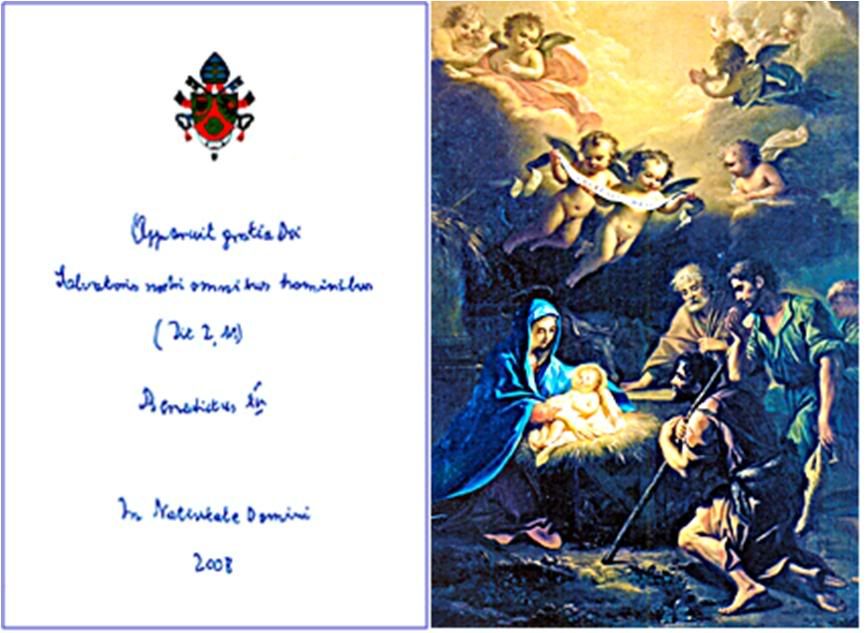 Apparuit gratia Dei Salvatoris nostri omnibus hominibus(Titus 2,11)
Apparuit gratia Dei Salvatoris nostri omnibus hominibus(Titus 2,11)
(The grace of God has appeared, saving all)
'THE NATIVITY', Niccolo La Piccola, 1775.
A BLESSED CHRISTMAS TO ALL!
 Pope gives Curia
Pope gives Curia
treats and heavy 2008 analysis
to chew on for Christmas
By John Thavis

VATICAN CITY, Dec. 23 (CNS) -- Pope Benedict XVI gave his Roman Curia officials the traditional bottle of "spumante" and panettone cake for Christmas, and he added a gift they can chew on for days: a seven-page speech on the Holy Spirit's presence in the Church events of 2008.
As every year, the Pope met Dec. 22 with his top administrators to exchange Christmas greetings and review the year as it draws to a close. His talk was not a simple "Best of '08" list, however, but a probing analysis of what lies behind some of the Church's most visible activities.
In particular, he offered his own take on two issues that prompted headlines in recent months, but whose meaning the Pope evidently believes is misunderstood: the international World Youth Day celebrations and the Vatican's increasingly strong pronouncements on ecology.
The Pope recalled his trip to Australia for the World Youth Day mega-gathering in July, where he presided over events with 200,000 young people from around the world. Fears of paralyzed traffic or public disturbances proved unfounded, he said, and the encounter turned out to be a "festival of joy."
But what kind of celebration was it? he asked. Some view these World Youth Day gatherings as the church's version of a rock concert, where the Pope is just the main attraction, he said. Others, including Catholics, wonder whether they really have any lasting impact on the participants.
The Pope responded by saying these objections don't take into account the power of the Holy Spirit. It was typical of the academic Pontiff that in explaining this point he quoted first the German philosopher Friedrich Nietzsche, who once said throwing a party wasn't as hard as finding people able to attend it with joy.
Then he quoted St. Paul, who said joy is the fruit of the Holy Spirit -- something abundantly evident at World Youth Day. He pointed out that the Australian assembly was the culmination of a long spiritual pilgrimage for the young participants, one focused intensely on Christ.
"So even the Pope is not the star around which all this turns," he said.
Those who describe the youth encounters as the Catholic variant of rock festivals, he added, are really trying to remove the all-important "question of God" from the discussion.
In a similar way, the Pope said, the Church's teaching on ecology needs to be understood as arising from God -- the "creator Spirit" -- who made the earth and its creatures with an "intelligent structure" that demands respect. Because of faith, the Church has a responsibility for protecting the created world and for proclaiming publicly this environmental responsibility, he said.
The Pope then explained why the human being must be at the center of the Church's ecological concern.
"The Church must protect not only the earth, the water and the air as gifts of creation that belong to everyone. It must also protect man against self-destruction," he said. "The tropical forests certainly deserve our protection, but man as a creature does not deserve any less."
By "self-destruction," the Pope said he meant "contempt for the Creator," and he said examples could be found in so-called "gender" issues today. He offered a case in point: Marriage as a permanent union between a man and a woman was something instituted by God as "the sacrament of creation."
Although the Pope didn't specifically talk about same-sex marriage, the meaning was clear enough to prompt some unusual headlines about rain forests and homosexuals.
The Pope said the Holy Spirit was the protagonist of another important event of 2008, the Synod of Bishops on Scripture. The synod emphasized that, far from being a dead letter, the word of God is alive and is speaking to contemporary Christians in a modern Pentecost, he said.
In ending his speech, the Pope returned to St. Paul's description of joy as a fruit of the Spirit. The Pope underlined a point he's made occasionally throughout the year: that Christianity should be seen not as a religion of rules and prohibitions, but as a source of joy that springs from Christ's salvation.
"He is joy. Joy is the gift in which all other gifts are summed up. It's the expression of happiness, of being in harmony with oneself, which can only happen when one is in harmony with God and his creation," he said.
The nature of joy is to radiate, and to want to communicate itself to others -- and in a nutshell, that's the missionary spirit of the church, he said.
He left his Roman Curia members with his Christmas wish: that this kind of joy stay alive and spread through a world filled with tribulations.
Thank you, John Thavis, for an excellent news report that did not rely on citing blocks of quotations, but paraphrased the main points, and more importantly, reported the sense - of the Pope's speech very well and accurately, choosing the appropriate quotation as needed.
This is the way journalists were once taught to write, and Thavis's piece is almost a primer on how to report a major speech that makes lots of important points!
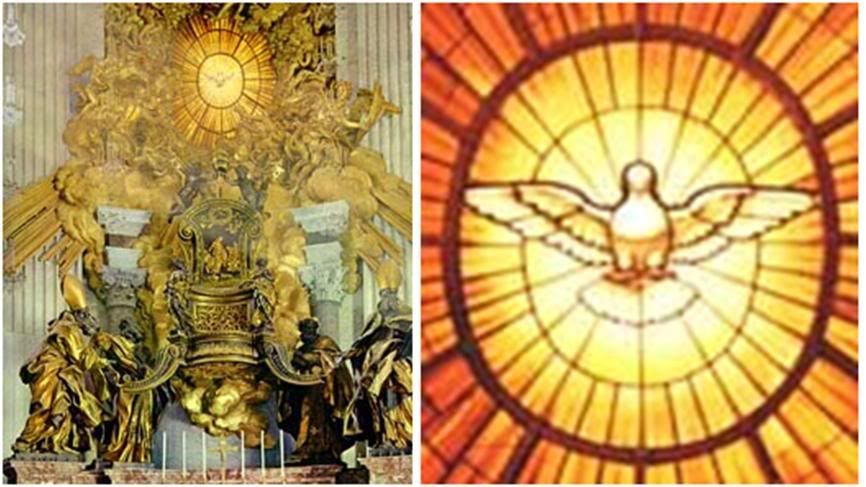 The Altar of Peter's Chair and the Church's presiding Holy Spirit, St. Peter's basilica.
'Veni Creator Spiritus':
The Altar of Peter's Chair and the Church's presiding Holy Spirit, St. Peter's basilica.
'Veni Creator Spiritus':
For an Ecology of Man
And of man created male and female.
In his pre-Christmas address to the Roman curia, Benedict XVI contests the ideology of gender.
And he strikes a blow in defense of the most contested of encyclicals, Humanae Vitae.

ROME, December 24, 2008 – Wishing a happy Christmas to the Roman curia, two days ago, Benedict XVI in reality addressed the entire Church and the world.
As in previous years, this time as well in the pre-Christmas address he wanted to emphasize some of the main outlines of his pontificate.
In 2005, the focus of his address was the interpretation and implementation of Vatican Council II, and the relationship between continuity and renewal in the Church.
In 2006, the pope placed the question of God at the center. Moreover, taking his cue from his trip to Istanbul, he formulated in the clearest way possible his vision of relations with Islam, proposing to the Muslim world the journey already undertaken by Christianity under the challenge of the Enlightenment.
In 2007, Benedict XVI focused on the urgency for the Church to take a missionary approach to all the peoples of the earth.
This year, taking his cue from World Youth Day and from the Synod of Bishops on the Word of God, Papa Ratzinger developed a reflection on the Holy Spirit, the most "forgotten" – as he said in Sydney – of the three persons of the divine Trinity, and yet supremely influential over the life of man and of the cosmos.
The entire discourse can be read on the Vatican website, as it is gradually translated into various languages, while the most important sections are presented below. In these, Benedict XVI reflects first on World Youth Day, and then on the Holy Spirit.
In regard to World Youth Day, the Pope overturns the 'conventional wisdom' – supported also by "Catholic voices" – that reduces these encounters to "a sort of rock festival adapted for ecclesial purposes, with the Pope as its star." No, he says. The Pope is "entirely and solely the Vicar" of the only presence that counts, that of Jesus crucified and risen.
As for the Holy Spirit, Benedict XVI insists first of all that he is the Creator. The cosmos bears his marks, as an orderly "mathematical structure" that for this reason is intelligible to the modern natural sciences.
But man also bears the marks of the order of creation within himself. The human being as man or woman "is not outdated metaphysics," and marriage is "a sacrament of creation."
The ideology of "gender," which leaves to each individual to 'decide his sex', ends up destroying instead of protecting.
The Pope said an "ecology of man" is needed, that not ony nature must be protected, but man himself, that respect for the order of creation "does not mean the contradiction of our freedom, but its precondition."
By virtue of these considerations, at the end of the section dedicated to the Creator Spirit, Papa Ratzinger exalts in ringing tones the encyclical Humanae Vitae by Paul VI, because it defends "love against sexuality as consumption, the future against the exclusive claims the present, and the human nature against its manipulation."
And with this, he rejects the criticisms recently aimed against this encyclical by a prominent cardinal, Carlo Maria Martini.
[ Magister then posts a partial translation of teh Pope's Curial speech.] [Modificato da TERESA BENEDETTA 27/12/2008 20:08] |
|
 24/12/2008 20:26 24/12/2008 20:26 |
|
| | | OFFLINE | | Post: 16.070 | Registrato il: 28/08/2005
| Utente Gold | |
|
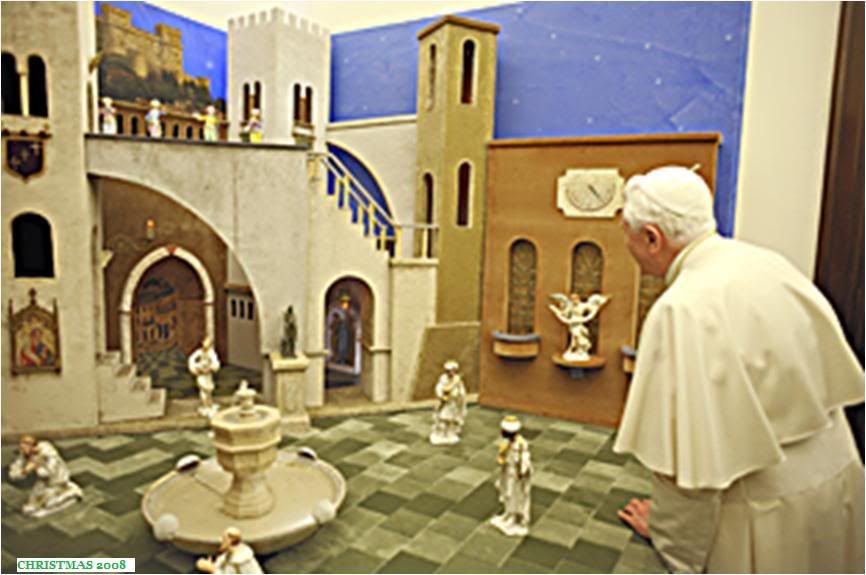 Pope Benedict admires a Creche in the papal apartments. [This OR photo omits Jesus and Mary from the frame, unfortunately. Is that Joseph on the left?
Pope Benedict admires a Creche in the papal apartments. [This OR photo omits Jesus and Mary from the frame, unfortunately. Is that Joseph on the left?
Below, tne Nativity scene on St. Peter's Square. .
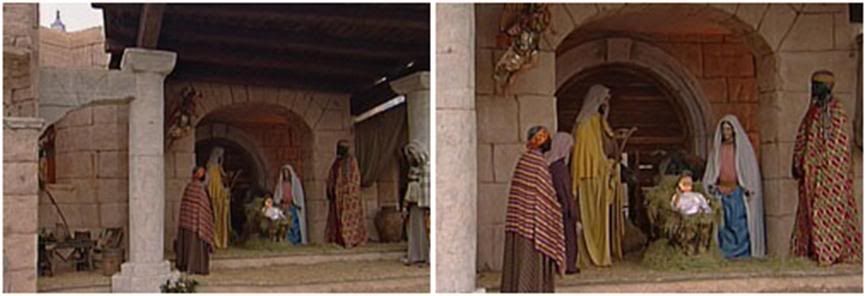 Pope's Christmas schedule under way,
Pope's Christmas schedule under way,
lights 'Candle of Peace'
VATICAN CITY, Dec. 24 (AP)- With the lighting of a single candle and an invitation to prayer, Pope Benedict XVI opened Christmas celebrations Wednesday in chilly St. Peter’s Square.
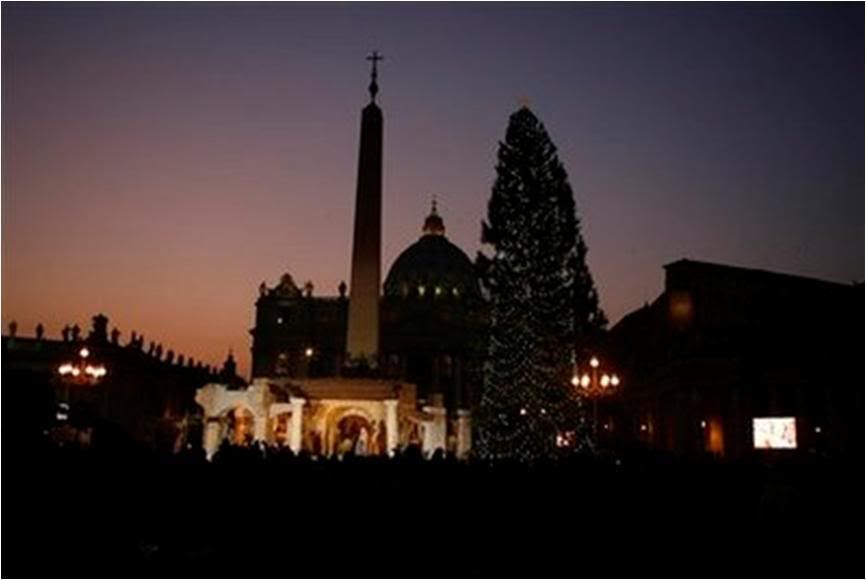
The Vatican's Christmas festivities began several hours earlier Wednesday with the unveiling of the larger-than-life Nativity scene next to the Vatican's largest-ever Christmas tree in St. Peter's Square.
Children in red-and-white Santa hats sang Italian holiday hymns as the Vatican's Gendarmeria band played alongside. The Vatican's No. 2 official, Cardinal Tarcisio Bertone, led the faithful in prayers in the chilly square.
At nightfall, Benedict lit a candle in his studio window in a sign of peace and blessed the crowd.
Before the pope appeared in his darkened studio, Bertone said the gesture was an invitation to all to pray for peace and think of those who are less fortunate.
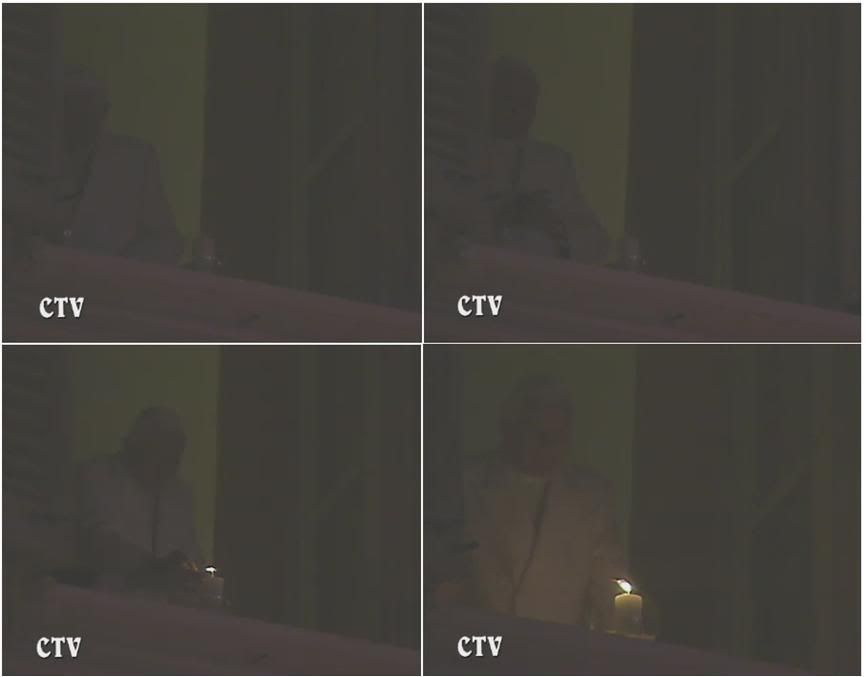
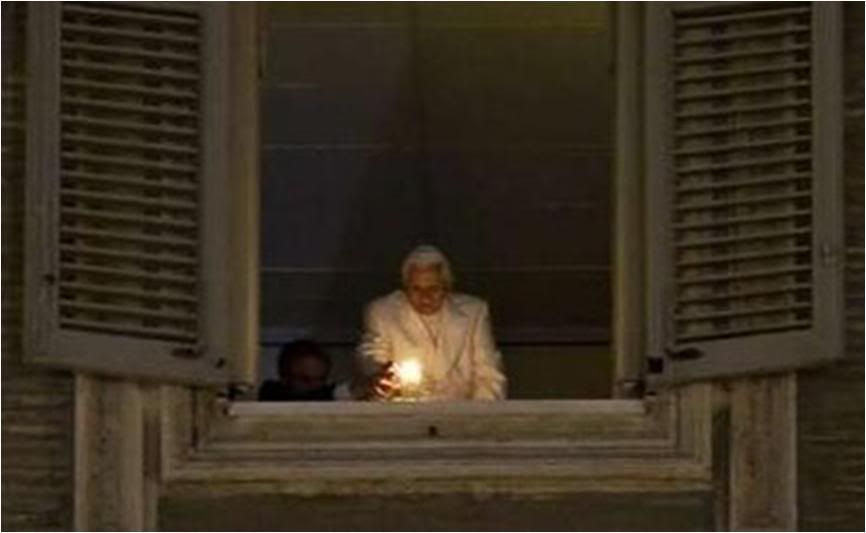
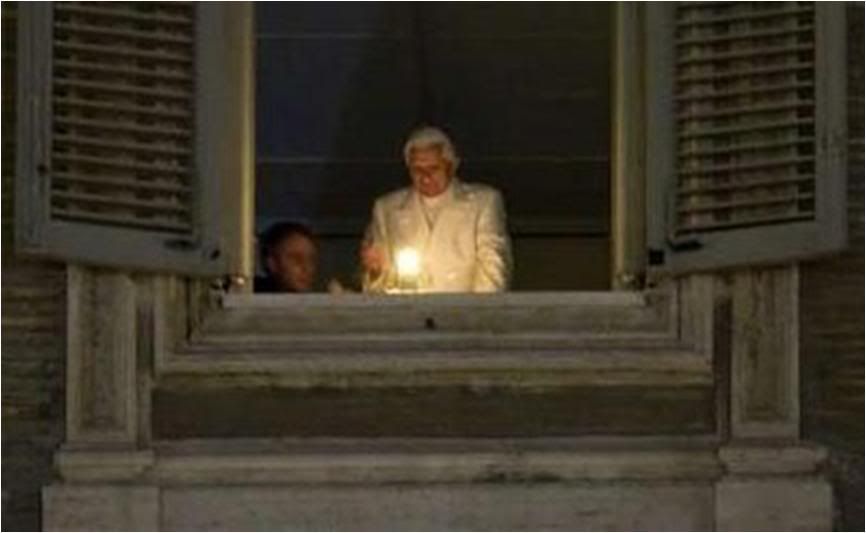
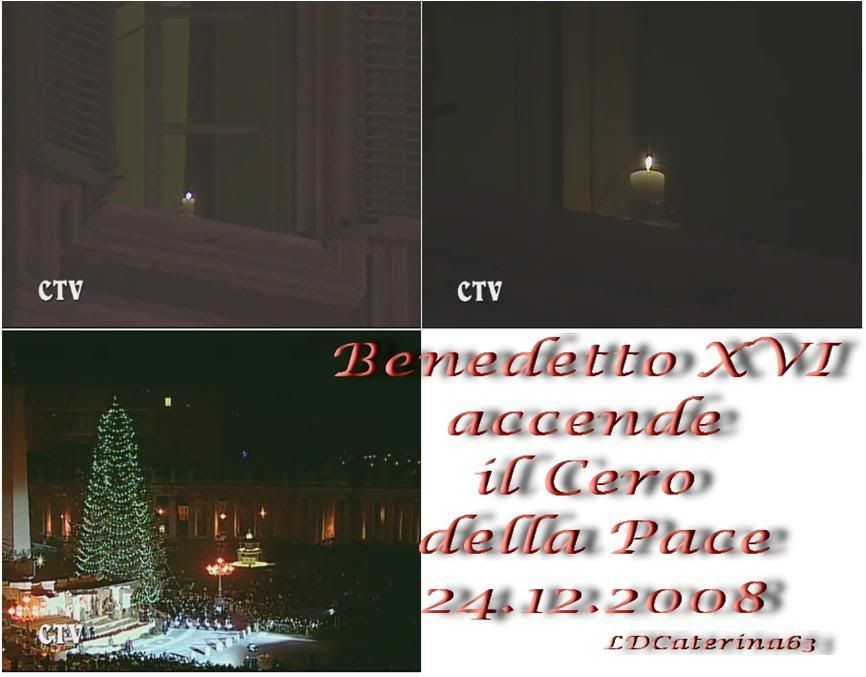 Grazie, da sempre, Caterina!
Grazie, da sempre, Caterina!
Benedict will lead the faithful in Mass at midnight inside St. Peter's Basilica celebrating the birth of Christ.
Benedict delivers his traditional Christmas Day "Urbi et Orbi" speech — Latin for "to the city and to the world" — from the balcony of St. Peter's Basilica on Thursday, and is then expected to issue Christmas greetings in more than 60 languages.
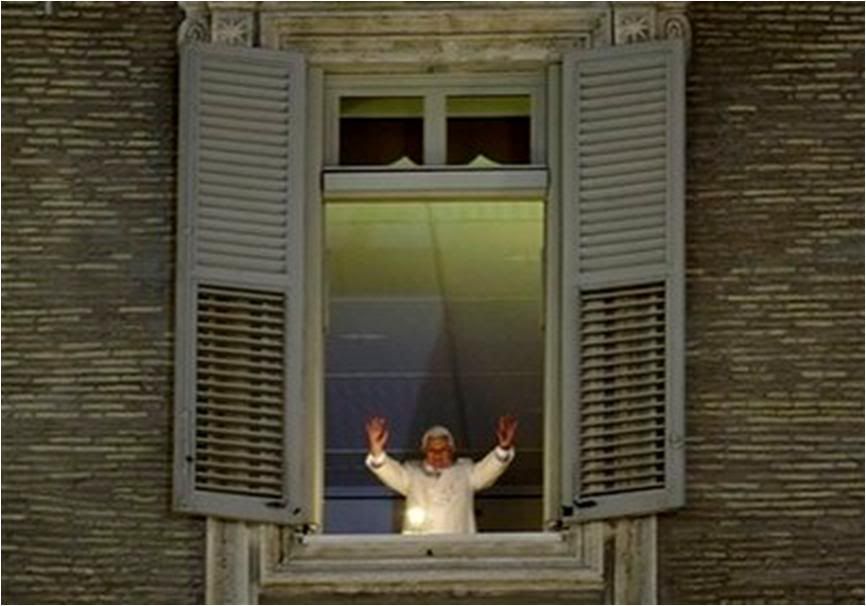
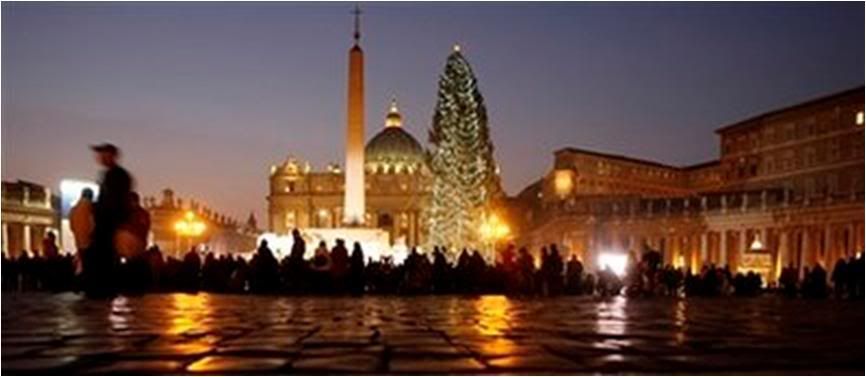
[Modificato da TERESA BENEDETTA 25/12/2008 16:07] |
 25/12/2008 02:27 25/12/2008 02:27 |
|
| | | OFFLINE | Post: 1.692 | Registrato il: 27/11/2005
| Utente Veteran | |
|
I've just watched Midnight Mass from Saint Peter's - Papa's fourth Christmas as our Holy Father and he was more magnificent than ever!!!!!
Thank you Teresa for updating the news so swiftly and special thank you to Caterina for the lovely montage!!!!!!!
If anyone was watching the Mass and saw a scuffle as Papa was coming back down the aisle at the end.....it wasn't me!!!!!!! I am safely tucked up in my home in England. A woman was, apparently, over-enthusiastic and had to be restrained. Honestly, Officer, it wasn't me!!!!!! Wonder who it was!!!!!????
![[SM=g27828]](https://im0.freeforumzone.it/up/0/28/9572832.gif) ![[SM=g27829]](https://im0.freeforumzone.it/up/0/29/8933109.gif) ![[SM=g27828]](https://im0.freeforumzone.it/up/0/28/9572832.gif) ![[SM=g27829]](https://im0.freeforumzone.it/up/0/29/8933109.gif) ![[SM=g27828]](https://im0.freeforumzone.it/up/0/28/9572832.gif) |
 25/12/2008 02:51 25/12/2008 02:51 |
|
| | | OFFLINE | Post: 3.499 | Registrato il: 23/11/2005
| Utente Master | |
|
The Scuffle
Okay, if it wasn't Mary, who was it? ![[SM=g27833]](https://im0.freeforumzone.it/up/0/33/6206759.gif) Nan just came back from Rome so it wasn't her. Benevolens has been posting lately so it's probably not her. Uh-oh, benedetto.fan hasn't posted in a while. Hmmm. ![[SM=g27818]](https://im0.freeforumzone.it/up/0/18/21113862.gif)
Or, could it be Concetta? Actually, I've always thought it was just a matter of time with her.
Guess we'll have to watch the latest items in the media to find out. Poor Papa, he can't help being so magnetic.
|
 25/12/2008 03:41 25/12/2008 03:41 |
|
| | | OFFLINE | | Post: 16.071 | Registrato il: 28/08/2005
| Utente Gold | |
|
 MIDNIGHT MASS
MIDNIGHT MASS
AT ST. PETER'S
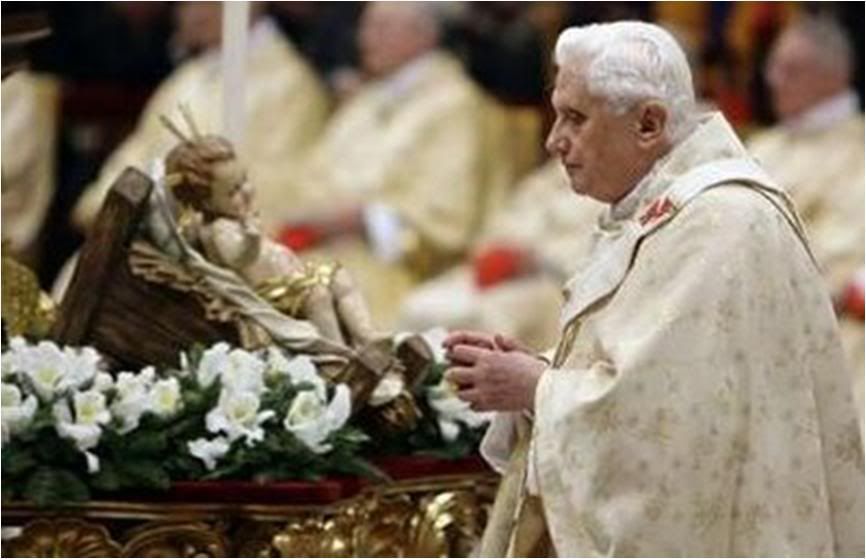
VATICAN CITY, December 25 (AP) ― Pope Benedict XVI ushered in Christmas at the Vatican as he led the celebration of Midnight Mass in the splendor of St. Peter's Basilica early Thursday.
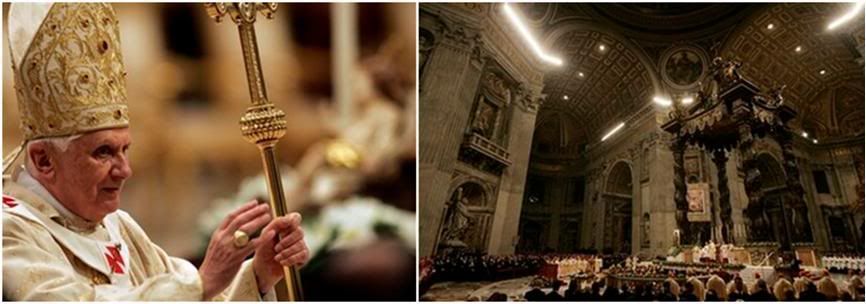
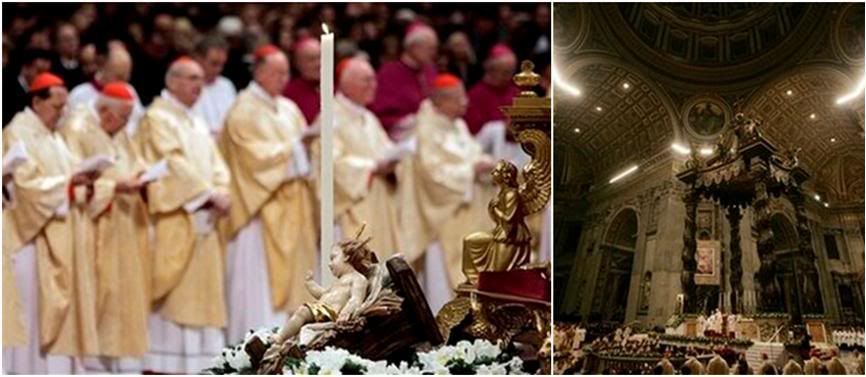
Dressed in white and gold-colored vestments, the 81-year-old Benedict walked in a procession up the main aisle, smiling and stopping several times to shake outstretched hands and bless children.
As a choir intoned a Psalm, the pope sprinkled incense on the central altar under Bernini's towering bronze baldachin before opening the service with the traditional wish for peace in Latin: "Pax vobis" ("Peace be with you"). The faithful responded: "Et cum spiritu tuo." ("And also with you.")
Thousands of pilgrims, Romans and tourists packed the basilica for the midnight service. For those unable to enter there were giant screens set up in St. Peter's Square.
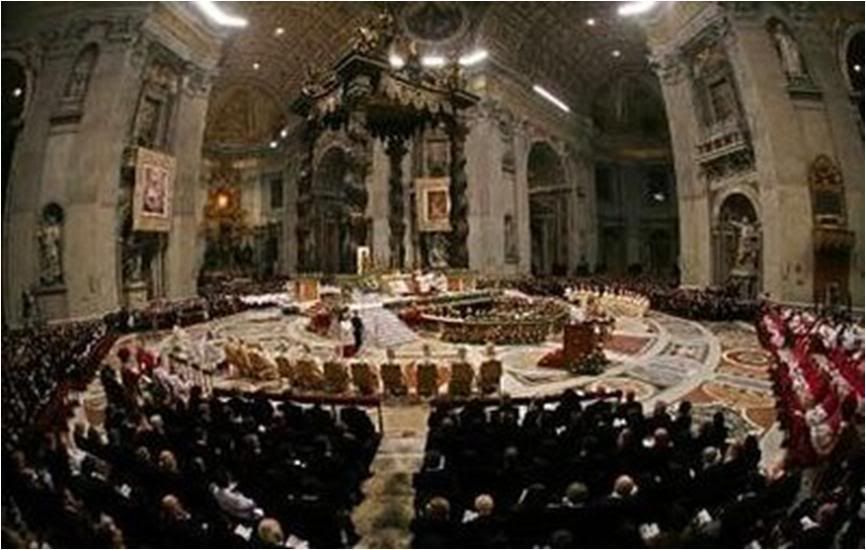
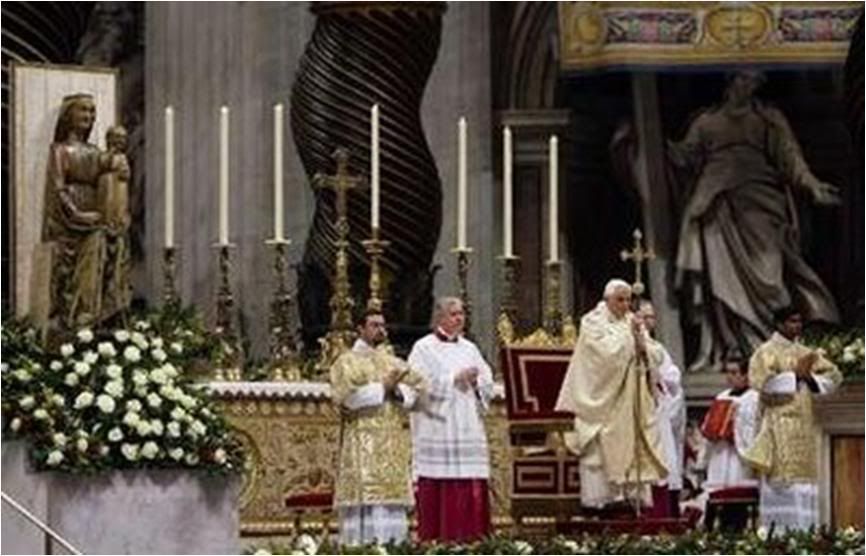
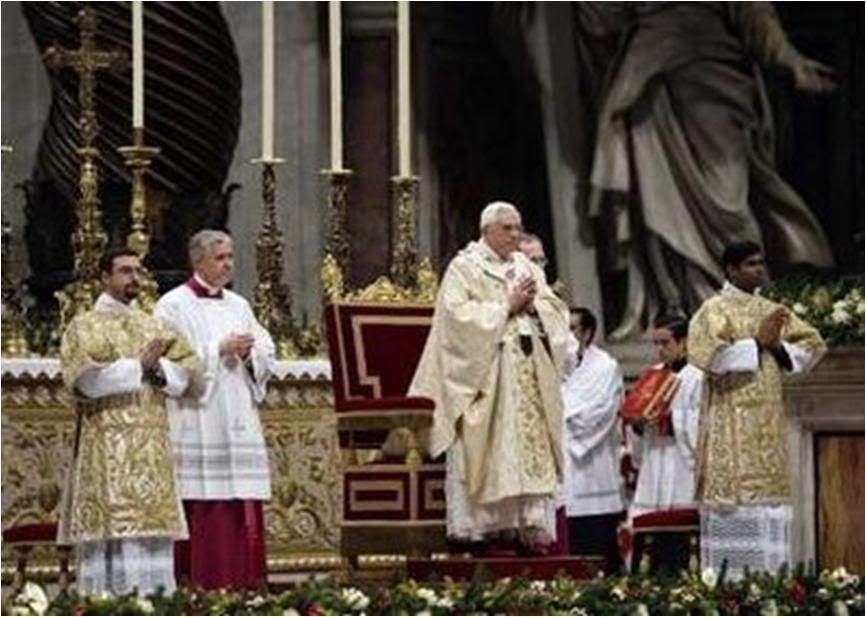
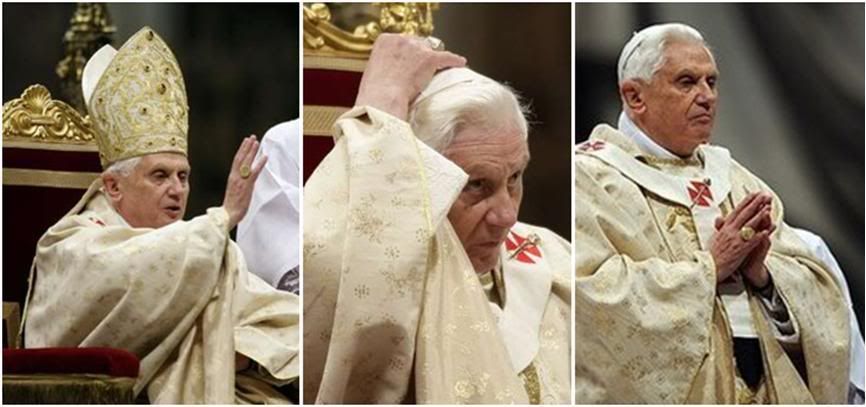 'ET INCARNATUS EST'
'ET INCARNATUS EST'
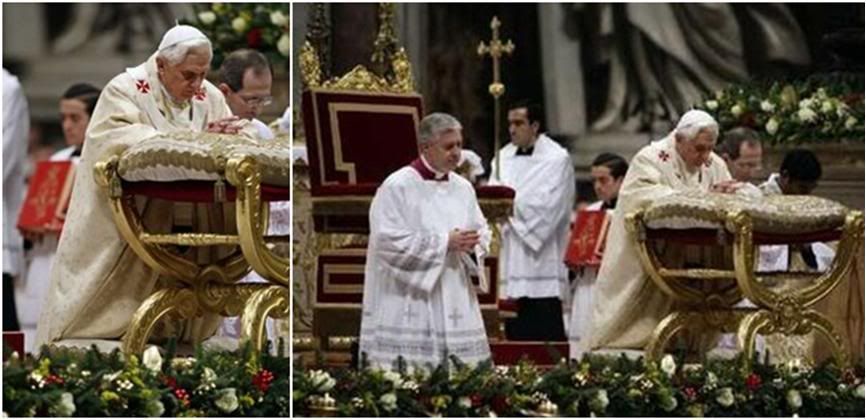 Let us all thank Vatican Radio for coming through so promptly tonight with the translation of the Pope's turly wondrous homily - such fresh images and approaches to a 2000-year-old story:
Let us all thank Vatican Radio for coming through so promptly tonight with the translation of the Pope's turly wondrous homily - such fresh images and approaches to a 2000-year-old story:
THE HOLY FATHER'S CHRISTMAS HOMILY
Official translation from
Vatican Radio
Dear Brothers and Sisters,
“Who is like the Lord our God, who is seated on high, who looks far down upon the heavens and the earth?”
This is what Israel sings in one of the Psalms (113 [112], 5ff.), praising God’s grandeur as well as his loving closeness to humanity.
God dwells on high, yet he stoops down to us… God is infinitely great, and far, far above us. This is our first experience of him.
The distance seems infinite. The Creator of the universe, the one who guides all things, is very far from us: or so he seems at the beginning.
But then comes the surprising realization: The One who has no equal, who “is seated on high”, looks down upon us. He stoops down. He sees us, and he sees me.
God’s looking down is much more than simply seeing from above. God’s looking is active. The fact that he sees me, that he looks at me, transforms me and the world around me.
The Psalm tells us this in the following verse: “He raises the poor from the dust…” In looking down, he raises me up, he takes me gently by the hand and helps me – me! – to rise from depths towards the heights.
“God stoops down”. This is a prophetic word. That night in Bethlehem, it took on a completely new meaning. God’s stooping down became real in a way previously inconceivable. He stoops down – he himself comes down as a child to the lowly stable, the symbol of all humanity’s neediness and forsakenness.
God truly comes down. He becomes a child and puts himself in the state of complete dependence typical of a newborn child. The Creator who holds all things in his hands, on whom we all depend, makes himself small and in need of human love. God is in the stable.
In the Old Testament the Temple was considered almost as God’s footstool; the sacred ark was the place in which he was mysteriously present in the midst of men and women. Above the temple, hidden, stood the cloud of God’s glory.
Now it stands above the stable. God is in the cloud of the poverty of a homeless child: an impenetrable cloud, and yet – a cloud of glory! How, indeed, could his love for humanity, his solicitude for us, have appeared greater and more pure?
The cloud of hiddenness, the cloud of the poverty of a child totally in need of love, is at the same time the cloud of glory. For nothing can be more sublime, nothing greater than the love which thus stoops down, descends, becomes dependent. The glory of the true God becomes visible when the eyes of our hearts are opened before the stable of Bethlehem.
Saint Luke’s account of the Christmas story, which we have just heard in the Gospel, tells us that God first raised the veil of his hiddenness to people of very lowly status, people who were looked down upon by society at large – to shepherds looking after their flocks in the fields around Bethlehem.
Luke tells us that they were “keeping watch”. This phrase reminds us of a central theme of Jesus’s message, which insistently bids us to keep watch, even to the Agony in the Garden – the command to stay awake, to recognize the Lord’s coming, and to be prepared.
Here too the expression seems to imply more than simply being physically awake during the night hour. The shepherds were truly “watchful” people, with a lively sense of God and of his closeness. They were waiting for God, and were not resigned to his apparent remoteness from their everyday lives.
To a watchful heart, the news of great joy can be proclaimed: for you this night the Saviour is born. Only a watchful heart is able to believe the message. Only a watchful heart can instil the courage to set out to find God in the form of a baby in a stable. Let us ask the Lord to help us, too, to become a “watchful” people.
Saint Luke tells us, moreover, that the shepherds themselves were “surrounded” by the glory of God, by the cloud of light. They found themselves caught up in the glory that shone around them. Enveloped by the holy cloud, they heard the angels’ song of praise: “Glory to God in the highest heavens and peace on earth to people of his good will”.
And who are these people of his good will if not the poor, the watchful, the expectant, those who hope in God’s goodness and seek him, looking to him from afar?
The Fathers of the Church offer a remarkable commentary on the song that the angels sang to greet the Redeemer. Until that moment – the Fathers say – the angels had known God in the grandeur of the universe, in the reason and the beauty of the cosmos that come from him and are a reflection of him.
They had heard, so to speak, creation’s silent song of praise and had transformed it into celestial music. But now something new had happened, something that astounded them. The One of whom the universe speaks, the God who sustains all things and bears them in his hands – he himself had entered into human history, he had become someone who acts and suffers within history.
From the joyful amazement that this unimaginable event called forth, from God’s new and further way of making himself known – say the Fathers – a new song was born, one verse of which the Christmas Gospel has preserved for us: “Glory to God in the highest heavens and peace to his people on earth”.
We might say that, following the structure of Hebrew poetry, the two halves of this double verse say essentially the same thing, but from a different perspective.
God’s glory is in the highest heavens, but his high state is now found in the stable – what was lowly has now become sublime. God’s glory is on the earth, it is the glory of humility and love.
And even more: the glory of God is peace. Wherever he is, there is peace. He is present wherever human beings do not attempt, apart from him, and even violently, to turn earth into heaven. He is with those of watchful hearts; with the humble and those who meet him at the level of his own “height”, the height of humility and love.
To these people he gives his peace, so that through them, peace can enter this world.
The medieval theologian William of Saint Thierry once said that God – from the time of Adam – saw that his grandeur provoked resistance in man, that we felt limited in our own being and threatened in our freedom.
Therefore God chose a new way. He became a child. He made himself dependent and weak, in need of our love. Now – this God who has become a child says to us – you can no longer fear me, you can only love me.
With these thoughts, we draw near this night to the child of Bethlehem – to the God who for our sake chose to become a child. In every child we see something of the Child of Bethlehem. Every child asks for our love.
This night, then, let us think especially of those children who are denied the love of their parents. Let us think of those street children who do not have the blessing of a family home, of those children who are brutally exploited as soldiers and made instruments of violence, instead of messengers of reconciliation and peace.
Let us think of those children who are victims of the industry of pornography and every other appalling form of abuse, and thus are traumatized in the depths of their soul.
The Child of Bethlehem summons us once again to do everything in our power to put an end to the suffering of these children; to do everything possible to make the light of Bethlehem touch the heart of every man and woman.
Only through the conversion of hearts, only through a change in the depths of our hearts can the cause of all this evil be overcome, only thus can the power of the evil one be defeated.
Only if people change will the world change; and in order to change, people need the light that comes from God, the light which so unexpectedly entered into our night.
And speaking of the Child of Bethlehem, let us think also of the place named Bethlehem, of the land in which Jesus lived, and which he loved so deeply. And let us pray that peace will be established there, that hatred and violence will cease.
Let us pray for mutual understanding, that hearts will be opened, so that borders can be opened. Let us pray that peace will descend there, the peace of which the angels sang that night.
In Psalm 96 [95], Israel, and the Church, praises God’s grandeur manifested in creation. All creatures are called to join in this song of praise, and so the Psalm also contains the invitation: “Let all the trees of the wood sing for joy before the Lord, for he comes” (v. 12ff.).
The Church reads this Psalm as a prophecy and also as a task. The coming of God to Bethlehem took place in silence. Only the shepherds keeping watch were, for a moment, surrounded by the light-filled radiance of his presence and could listen to something of that new song, born of the wonder and joy of the angels at God’s coming.
This silent coming of God’s glory continues throughout the centuries. Wherever there is faith, wherever his word is proclaimed and heard, there God gathers people together and gives himself to them in his Body; he makes them his Body. God “comes”.
And in this way our hearts are awakened. The new song of the angels becomes the song of all those who, throughout the centuries, sing ever anew of God’s coming as a child – and rejoice deep in their hearts.
And the trees of the wood go out to him and exult. The tree in Saint Peter’s Square speaks of him, it wants to reflect his splendour and to say: Yes, he has come, and the trees of the wood acclaim him.
The trees in the cities and in our homes should be something more than a festive custom: they point to the One who is the reason for our joy – the God who for our sake became a child.
In the end, this song of praise, at the deepest level, speaks of him who is the very tree of new-found life. Through faith in him we receive life. In the Sacrament of the Eucharist he gives himself to us – he gives us a life that reaches into eternity.
At this hour we join in creation’s song of praise, and our praise is at the same time a prayer: Yes, Lord, help us to see something of the splendour of your glory. And grant peace on earth. Make us men and women of your peace. Amen.

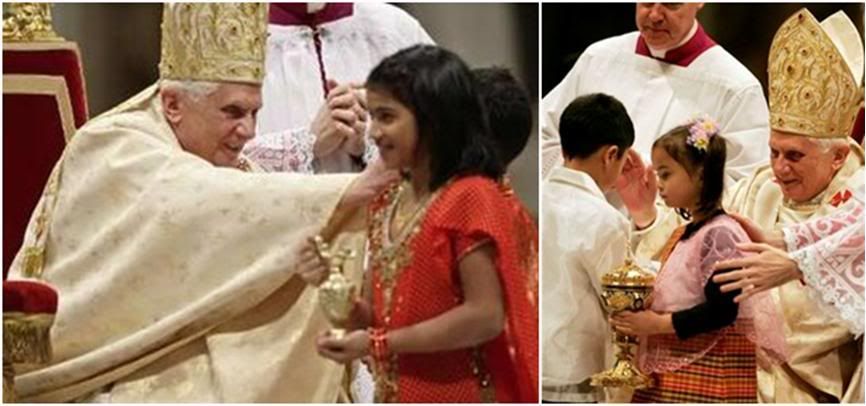
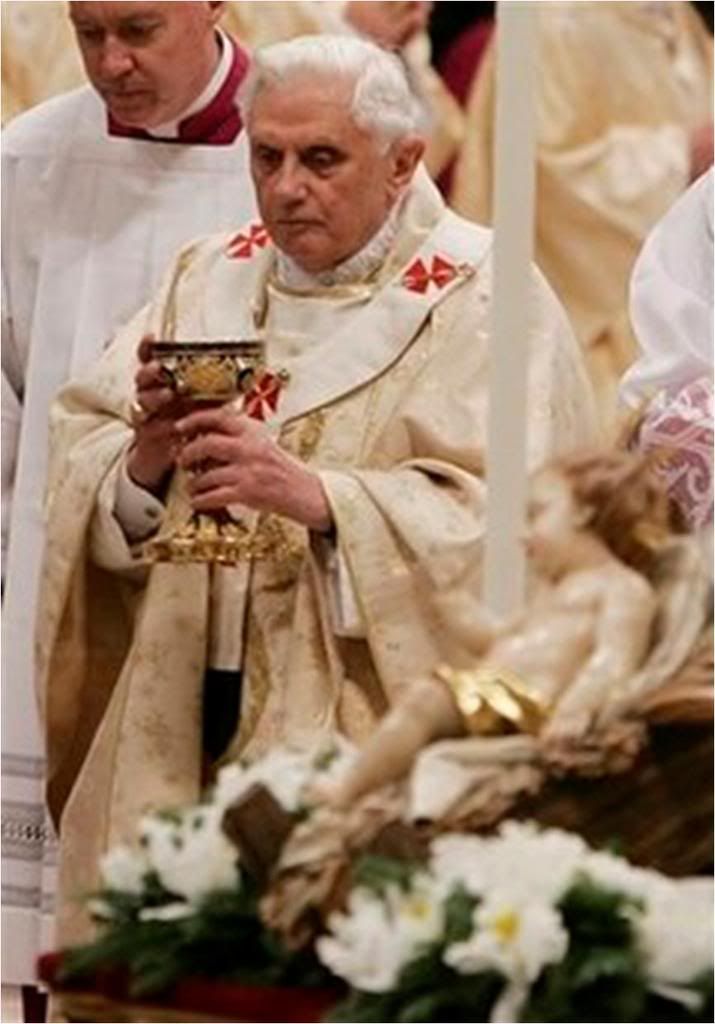 And what about EWTN cutting off the telecast at 7:52 - it had eight minutes left to the hour, for heaven's sake - without showing the Holy Father bringing the Baby Jesus to the Basilica Creche? I had my audio tuned to Vatican Radio and they finished the coverage with time to spare! [A throat specialist must have seen to our Papino's comfort because he did not once cough tonight! A very welcome bonus on top of everything else!]
And what about EWTN cutting off the telecast at 7:52 - it had eight minutes left to the hour, for heaven's sake - without showing the Holy Father bringing the Baby Jesus to the Basilica Creche? I had my audio tuned to Vatican Radio and they finished the coverage with time to spare! [A throat specialist must have seen to our Papino's comfort because he did not once cough tonight! A very welcome bonus on top of everything else!]
EWTN'S haste to sign off from the Vatican was inexplicable and unforgivable, especially in view of this news:
For the first time, Vatican offers
all TV feeds for the Christmas season
free of charge to any network

VATICAN CITY, Dec. 24 (Translated from Apcom) - A boom in the attendance at the traditional Midnight Mass in the Vatican tonight. even as this marks the first time that the Mass is being transmitted free of charge to any TV channel anywhere who can arrange to get a satellite downlink.
Not only the Midnight Mass, but tomorrow's Urbi et Orbi blessing; the December 31 Vespers, Te Deum and Adoration fof the Blessed Sacrament; and the New Year's Day Mass. All of it courtesy of teh Knights of Columbus, who will foot the bill for all the channels who avail of the opportunity.
The Pontifical Council for Social Communications said that last year, 88 networks from 60 countries broadcast the Midnight Mass on a paying basis. It will not be known till later how many channels worldwide picked up the Midnight Mass telecast.
As for the scuffle with the woman in red, the technical director had the presence of mind not to linger on it. Chief Inspector Giani sure subdued her fast! It was also a pleasant surprise to see the new commander of the Swiss Guard (in regular suit, of course) joining Giani and company to provide close-in security for the Holy Father. I don't think I remember the previous commander doing that...Vatican TV still showed too many random shots of children sleeping or people looking bored - and staying on the image for loooong seconds! While never once showing close-ups of the theme tapestries of the Nativity, and only one close-up I can remember of that primitive but magnificent wooden Madonna with the Child Jesus... The deacons' dalmatics tonight were more ornate than the Pope's chasuble... And I never noticed before that Cardinal Sodano looks like Dick Cheney.... .
[Modificato da TERESA BENEDETTA 26/12/2008 03:15] |
 25/12/2008 05:05 25/12/2008 05:05 |
|
| | | OFFLINE | Post: 3.500 | Registrato il: 23/11/2005
| Utente Master | |
|
"And I never noticed before that Cardinal Sodano looks like Dick Cheney.... . "
Teresa
Maybe that was Dick Cheney.
As to the scuffle, CNN showed some footage of Papa processing slowly out through the cathedral with the scuffle almost off-camera on the right and said it was a man who jumped a barricade. The commotion had to be visible to Papa but he didn't acknowledge it and just slowed a half step to allow the security guys time to get whoever that was out of the passageway. Papa is so cool and so brave. ![[SM=g27811]](https://im0.freeforumzone.it/up/0/11/10151015.gif)
Okay, here is CNN's written comments on what happened:
"As Benedict was leaving down the main aisle, someone wearing red jumped the barrier. The person was swiftly tackled by security. The pope appeared to slow his step momentarily and take a slight step back as the action took place, but he quickly resumed the processional, waving to the audience."
*********************************************************************
So CNN couldn't tell the sex. I assumed it was a woman, perhaps because men don't usually wear red.
TERESA
[Modificato da TERESA BENEDETTA 25/12/2008 06:29] |
 25/12/2008 12:52 25/12/2008 12:52 |
|
| | | OFFLINE | Post: 1.693 | Registrato il: 27/11/2005
| Utente Veteran | |
|
|
 25/12/2008 13:27 25/12/2008 13:27 |
|
| | | OFFLINE | | Post: 16.075 | Registrato il: 28/08/2005
| Utente Gold | |
|
|
 25/12/2008 14:46 25/12/2008 14:46 |
|
| | | OFFLINE | | Post: 16.076 | Registrato il: 28/08/2005
| Utente Gold | |
|
THE HOLY FATHER'S
CHRISTMAS BLESSING
'URBI ET ORBI'
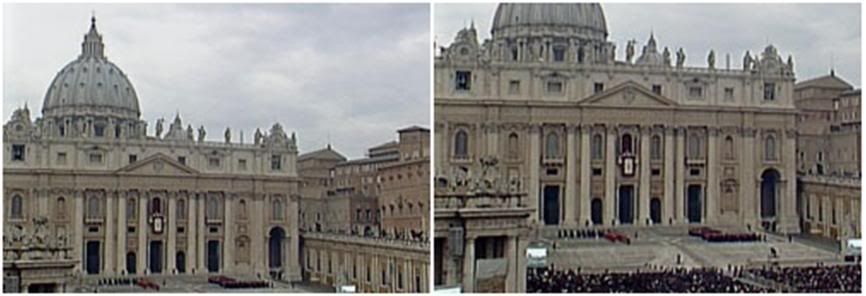
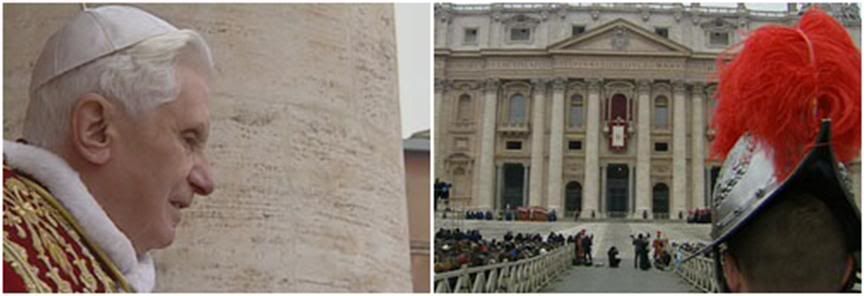
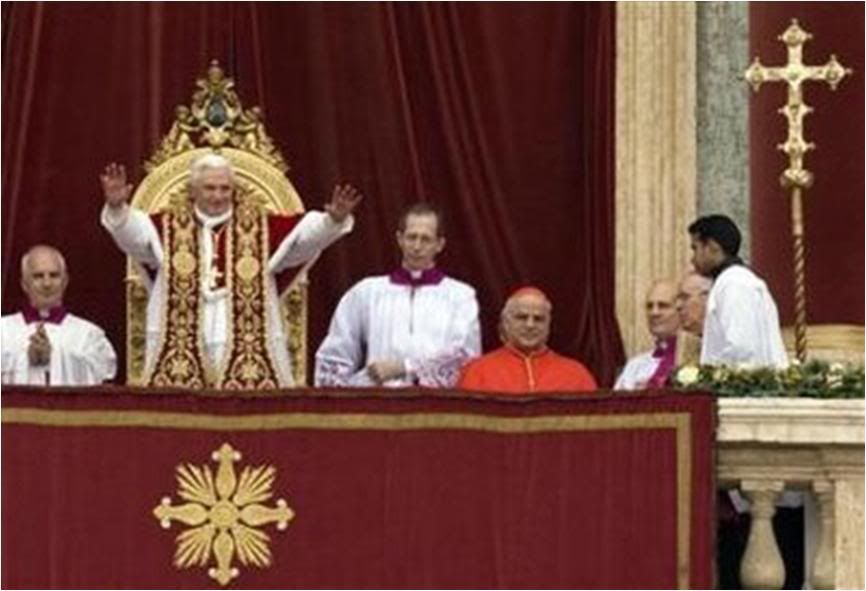
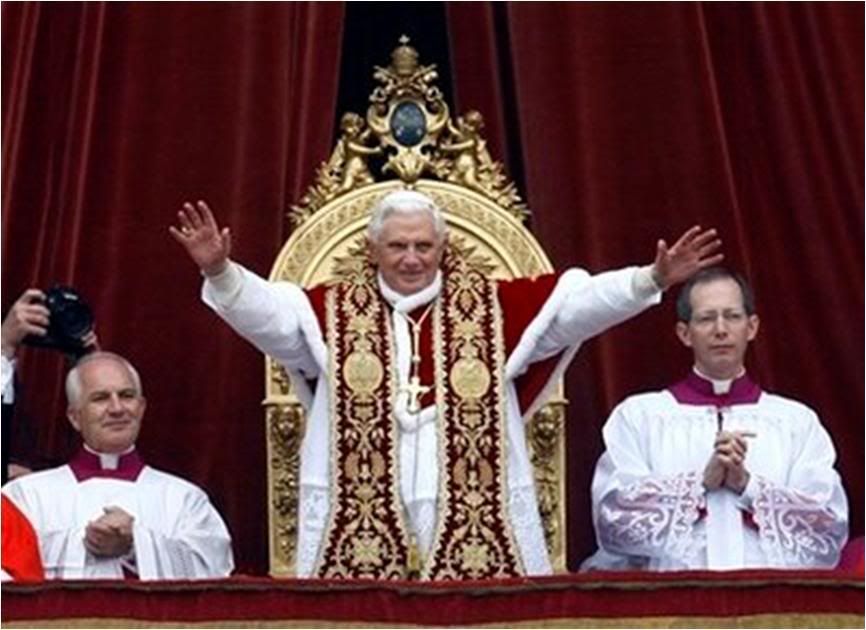
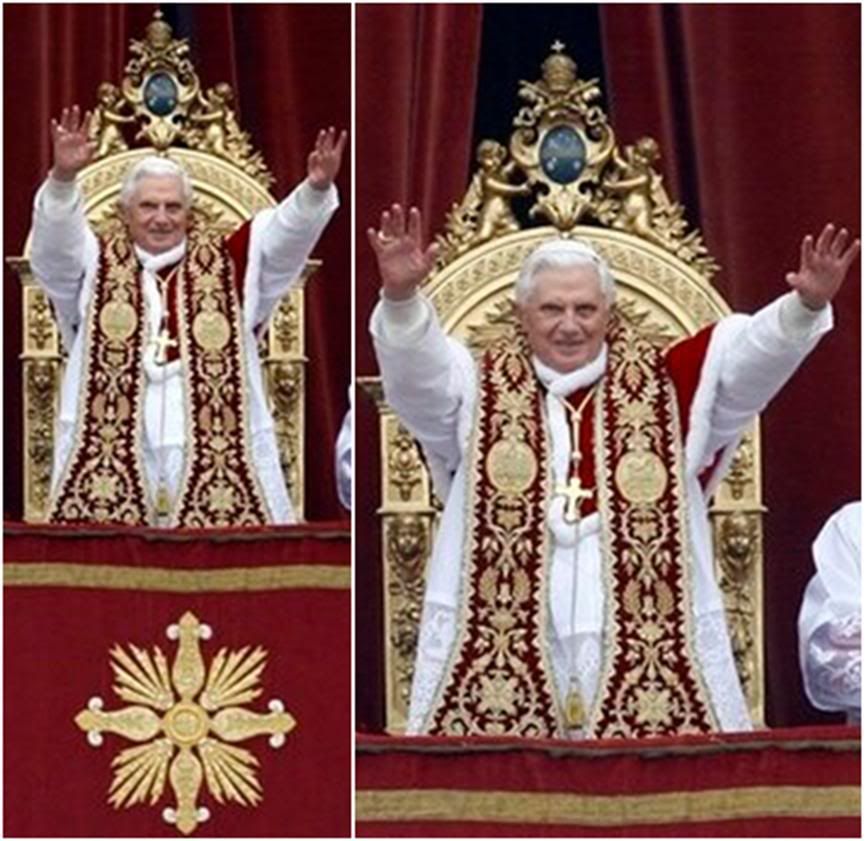

The Urbi et Orbi Message
of His Holiness Pope Benedict XVI
"Apparuit gratia Dei Salvatoris nostri omnibus hominibus" (Tit 2,11).
(The grace of God our Saviour has appeared to all.)
Dear brothers and sisters, in the words of the Apostle Paul, I once more joyfully proclaim Christ’s Birth. Today “the grace of God our Saviour” has truly “appeared to all”!
It appeared! This is what the Church celebrates today. The grace of God, rich in goodness and love, is no longer hidden. It “appeared”, it was manifested in the flesh, it showed its face.
Where? In Bethlehem. When? Under Caesar Augustus, during the first census, which the Evangelist Luke also mentions. And who is the One who reveals it? A newborn Child, the Son of the Virgin Mary. In him the grace of God our Saviour has appeared. And so that Child is called Jehoshua, Jesus, which means: “God saves”.
The grace of God has appeared. That is why Christmas is a feast of light. Not like the full daylight which illumines everything, but a glimmer beginning in the night and spreading out from a precise point in the universe: from the stable of Bethlehem, where the divine Child was born.
Indeed, he is the light itself, which begins to radiate, as portrayed in so many paintings of the Nativity. He is the light whose appearance breaks through the gloom, dispels the darkness and enables us to understand the meaning and the value of our own lives and of all history.
Every Christmas crib is a simple yet eloquent invitation to open our hearts and minds to the mystery of life. It is an encounter with the immortal Life which became mortal in the mystic scene of the Nativity: a scene which we can admire here too, in this Square, as in countless churches and chapels throughout the world, and in every house where the name of Jesus is adored.
The grace of God has appeared to all. Jesus – the face of the “God who saves”, did not show himself only for a certain few, but for everyone.
Although it is true that in the simple and lowly dwelling of Bethlehem few persons encountered him, still he came for all: Jews and Gentiles, rich and poor, those near and those far away, believers and non-believers… for everyone.
Supernatural grace, by God’s will, is meant for every creature. Yet each human person needs to accept that grace, to utter his or her own “yes”, like Mary, so that his or her heart can be illumined by a ray of that divine light.
It was Mary and Joseph, who that night welcomed the incarnate Word, awaiting it with love, along with the shepherds who kept watch over their flocks (cf. Lk 2:1-20). A small community, in other words, which made haste to adore the Child Jesus; a tiny community which represents the Church and all people of good will.
Today too those who await him, who seek him in their lives, encounter the God who out of love became our brother – all those who turn their hearts to him, who yearn to see his face and to contribute to the coming of his Kingdom.
Jesus himself would say this in his preaching: these are the poor in spirit; those who mourn, the meek, those who thirst for justice; the merciful, the pure of heart, the peacemakers, and those persecuted for righteousness’ sake (cf. Mt 5:3-10). They are the ones who see in Jesus the face of God and then set out again, like the shepherds of Bethlehem, renewed in heart by the joy of his love.
Brothers and sisters, all you who are listening to my words: this proclamation of hope – the heart of the Christmas message – is meant for all men and women.
Jesus was born for everyone, and just as Mary, in Bethlehem, offered him to the shepherds, so on this day the Church presents him to all humanity, so that each person and every human situation may come to know the power of God’s saving grace, which alone can transform evil into good, which alone can change human hearts, making them oases of peace.
May the many people who continue to dwell in darkness and the shadow of death (cf. Lk 1:79) come to know the power of God’s saving grace!
May the divine Light of Bethlehem radiate throughout the Holy Land, where the horizon seems once again bleak for Israelis and Palestinians. May it spread throughout Lebanon, Iraq and the whole Middle East.
May it bring forth rich fruit from the efforts of all those who, rather than resigning themselves to the twisted logic of conflict and violence, prefer instead the path of dialogue and negotiation as the means of resolving tensions within each country and finding just and lasting solutions to the conflicts troubling the region.
This light, which brings transformation and renewal, is besought by the people of Zimbabwe, in Africa, trapped for all too long in a political and social crisis which, sadly, keeps worsening, as well as the men and women of the Democratic Republic of Congo, especially in the war-torn region of Kiv; Darfur, in Sudan; and Somalia - whose interminable sufferings are the tragic consequence of the lack of stability and peace.
This light is awaited especially by the children living in those countries, and the children of all countries experiencing troubles, so that their future can once more be filled with hope.
- Wherever the dignity and rights of the human person are trampled upon;
- Wherever the selfishness of individuals and groups prevails over the common good;
- Wherever fratricidal hatred and the exploitation of man by man risk being taken for granted;
- Wherever internecine conflicts divide ethnic and social groups and disrupt peaceful coexistence;
- Wherever terrorism continues to strike; wherever the basics needed for survival are lacking;
- Wherever an increasingly uncertain future is regarded with apprehension, even in affluent nations:
In each of these places may the Light of Christmas shine forth and encourage all people to do their part in a spirit of authentic solidarity. If people look only to their own interests, our world will certainly fall apart.
Dear brothers and sisters, today, “the grace of God our Saviour has appeared” (cf. Tit 2:11) in this world of ours, with all its potential and its frailty, its advances and crises, its hopes and travails.
Today, there shines forth the light of Jesus Christ, the Son of the Most High and the son of the Virgin Mary: “God from God, light from light, true God from true God. For us men, and for our salvation, he came down from heaven”.
Let us adore him, this very day, in every corner of the world, wrapped in swaddling clothes and laid in a lowly manger. Let us adore him in silence, while he, still a mere infant, seems to comfort us by saying:
- Do not be afraid, “I am God, and there is no other” (Is 45:22). Come to me, men and women, peoples and nations, come to me. Do not be afraid: I have come to bring you the love of the Father, and to show you the way of peace. -
Let us go, then, brothers and sisters! Let us make haste, like the shepherds on that Bethlehem night.
God has come to meet us; he has shown us his face, full of grace and mercy! May his coming to us not be in vain!
Let us seek Jesus, let us be drawn to his light which dispels sadness and fear from every human heart.
Let us draw near to him with confidence, and bow down in humility to adore him. Merry Christmas to all!
As usual, great thanks to Caterina whose video-captures portray the event much more intimately than the impersonal news-agency photo choices:
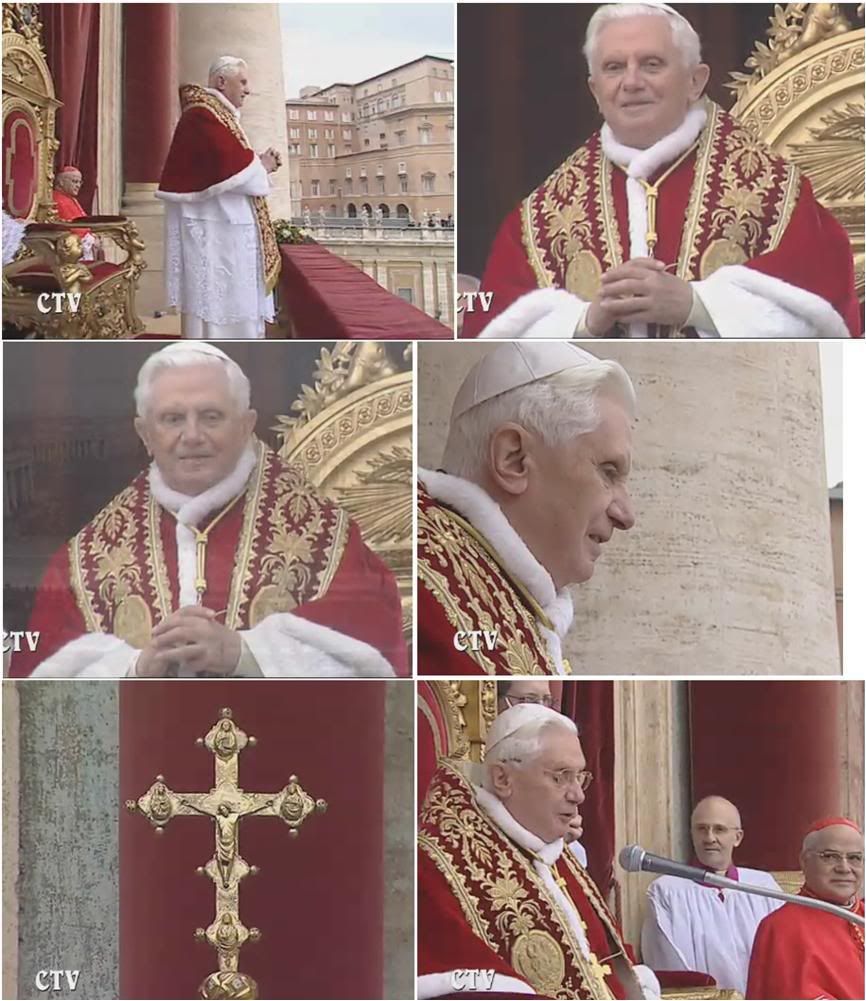
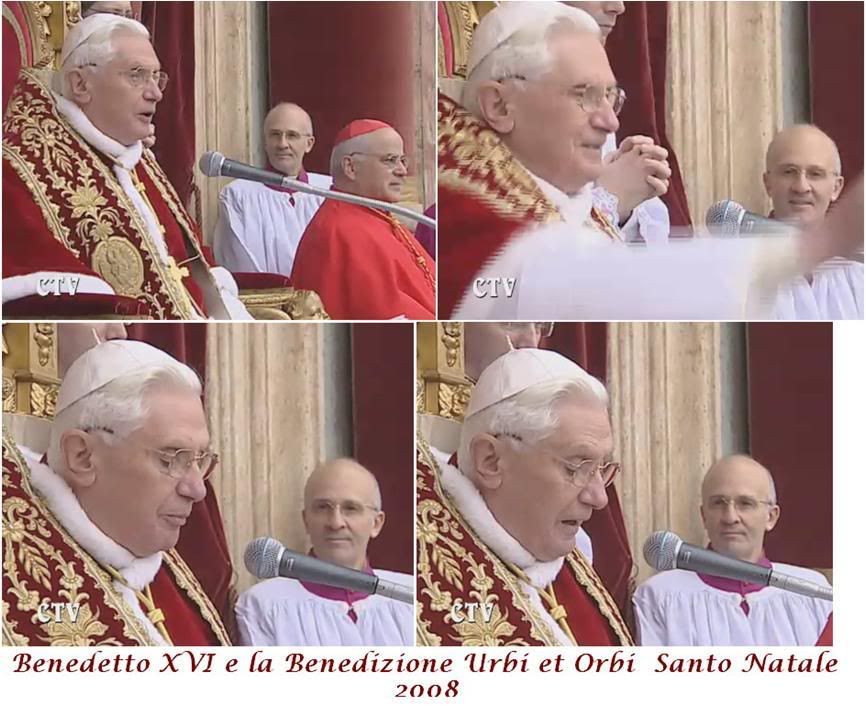 THE HOLY FATHER'S CHRISTMAS GREETINGS
THE HOLY FATHER'S CHRISTMAS GREETINGS
This year, Benedict XVI delivered the Christmas greetings in 64 languages, starting with Italian:
'BUON NATALE' to all the residents of Rome and all of Italy!
May the great feast of the Nativity of Christ be a source of light and confidence in the life of everyone.
In this time that is marked by a significant economic crisis, may Christmas be an occasion for greater solidarity among families and the communities who make up the beloved nation of Italy.
From the poor and humble cave of Bethlegem, may the light of hope spread everywhere and the proclamation resound that no one is alien to the love of the Redeemer.
His English message:
May the birth of the Prince of Peace remind the world where its true happiness lies; and may your hearts be filled with hope and joy, for the Saviour has been born for us.
The rest of the greetings may be found on
212.77.1.245/news_services/bulletin/news/23101.php?index=23101&po_date=25.12.2008...
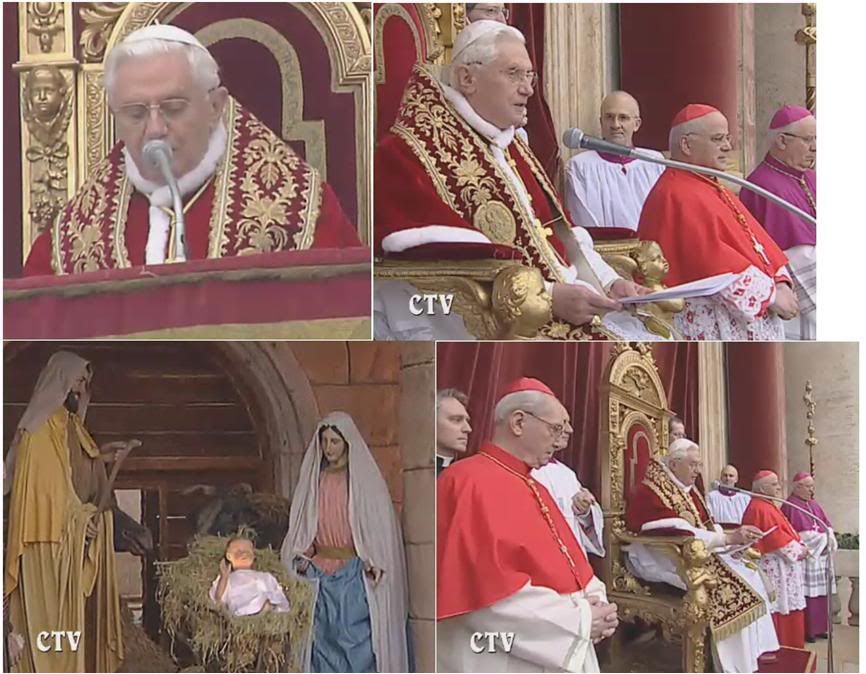
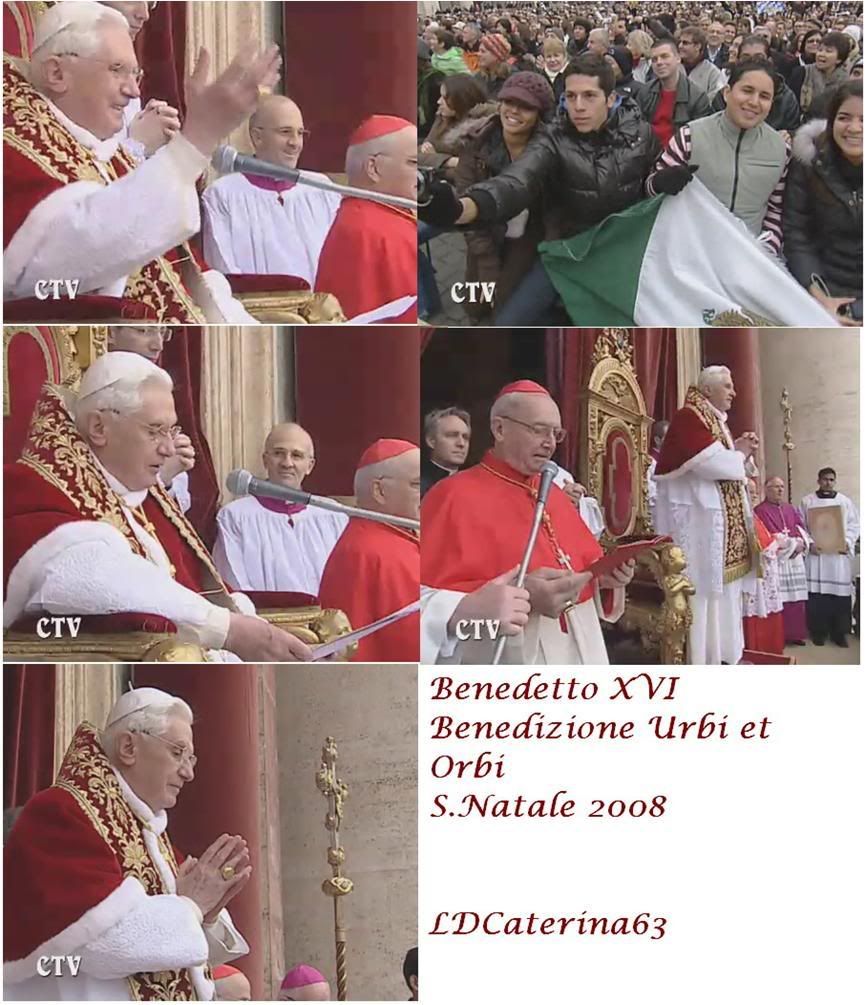
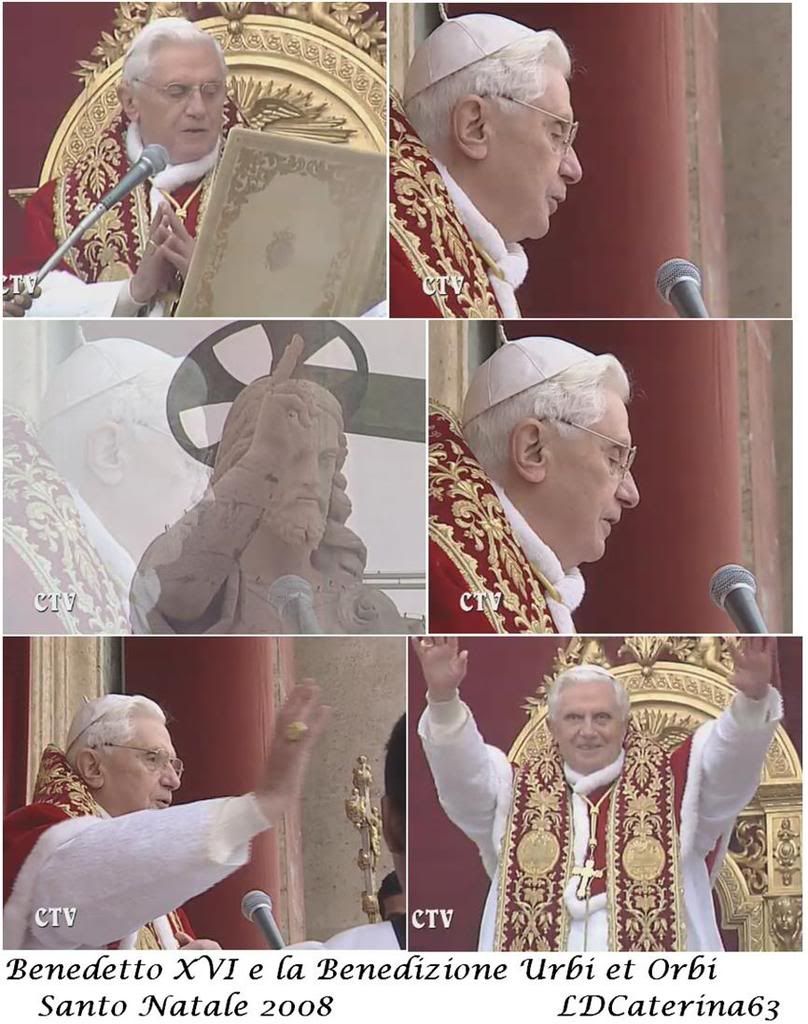
[Modificato da TERESA BENEDETTA 25/12/2008 17:59] |
 25/12/2008 21:28 25/12/2008 21:28 |
|
| | | OFFLINE | Post: 1.695 | Registrato il: 27/11/2005
| Utente Veteran | |
|
Superb photos and captures, Caterina!!!!!! I'll take ages to save them all! Thanks, Teresa, for the swift reporting and for the pics!!!!!
Right on!!!!! Viva Papa Benedetto XVI !!!!!!!!!!!!!!!!!! |
 26/12/2008 02:22 26/12/2008 02:22 |
|
| | | OFFLINE | | Post: 16.077 | Registrato il: 28/08/2005
| Utente Gold | |
|
|
 26/12/2008 05:06 26/12/2008 05:06 |
|
| | | OFFLINE | | Post: 16.078 | Registrato il: 28/08/2005
| Utente Gold | |
|
![[SM=x40796]](http://www.vocinelweb.it/faccine/mad/pag4/51.gif) ![[SM=x40796]](http://www.vocinelweb.it/faccine/mad/pag4/51.gif) ![[SM=x40796]](http://www.vocinelweb.it/faccine/mad/pag4/51.gif) ![[SM=x40796]](http://www.vocinelweb.it/faccine/mad/pag4/51.gif) ![[SM=x40796]](http://www.vocinelweb.it/faccine/mad/pag4/51.gif) ![[SM=x40796]](http://www.vocinelweb.it/faccine/mad/pag4/51.gif) ![[SM=x40796]](http://www.vocinelweb.it/faccine/mad/pag4/51.gif) ![[SM=x40796]](http://www.vocinelweb.it/faccine/mad/pag4/51.gif) ![[SM=x40796]](http://www.vocinelweb.it/faccine/mad/pag4/51.gif) ![[SM=x40796]](http://www.vocinelweb.it/faccine/mad/pag4/51.gif) ![[SM=x40796]](http://www.vocinelweb.it/faccine/mad/pag4/51.gif) ![[SM=x40796]](http://www.vocinelweb.it/faccine/mad/pag4/51.gif) Not my idea of Christmas Day reading, but there's more like it - and worse - where it comes from. The reporting in the United States has been based entirely so far on the perception such as encapsulated in the sub-head for this item:
Not my idea of Christmas Day reading, but there's more like it - and worse - where it comes from. The reporting in the United States has been based entirely so far on the perception such as encapsulated in the sub-head for this item:
Pope Benedict XVI: Gay and lesbian families a lethal threat to all humankind.(Source:Associated Press)
This article comes from a Boston-based online site, with bureaus in many major US cities, that describes itself this way: "EDGE is the largest network of local Gay, Lesbian, Bisexual and Transgender (GLBT) news and entertainment portals in the world, serving a quarter of a million dedicated readers from a variety of metropolitan areas around the United States."
Religious conservatives defend
Pope’s anti-gay message
by Kilian Melloy

Wednesday Dec 24, 2008
Catholic publications have rushed to the defense of Pope Benedict XVI’s comments that the human race is as imperiled by gay and lesbian families as by the wanton destruction of the rain forests.
Saying that the "order of creation" must be respected, the Pope claimed for the Catholic church a privileged place of instruction and authority over humanity [since when has the Church done so? It proposes its dostrine to those who are willing to listen and reason declaring that the church "must defend not only the earth, the water and the air as gifts of creation belonging to everyone, but it must also protect mankind against the destruction of itself. The tropical forests deserve our protection, but man as a creature deserves it no less."
The Pope also denounced families that do not consist of a man, a woman, and children, saying that recognition of family structures other than that constitute an "auto-destruction of mankind."
The Pope made his remarks as part of his annual Christmas Message, which he delivered on Dec. 22. [It is not, of course, his 'annual Christmas message' - it his annual message to the Roman Curia, the internal 'government' of the universal Church,]
Catholic Online in a Dec. 24 article, instantly grouped homosexuality with "promiscuity, pornography, [and] adultery" and declared that all those things are "hurting [gays] physically, psychologically, but most importantly--hurting them spiritually." [I have not seen the Catholic Online piece, but sometimes, a 'defense of the Pope can backfire - never mind what you say and how you say it, the reaction from those who feel they are being wronged will always react by simple hostile reflex.]
Catholic Online slammed Pink News for posting the headline, "Pope Benedict learnt nothing from his time in the Hitler Youth," and denounced headlines in the San Francisco Chronicle ("Pope Benedict at Christmas: Preaching bigotry disguised as compassion") and the Times of London ("Christmas was never meant to be about this").
The article defended Pope Benedict on the grounds that he had not used the world "homosexual," though he had made his meaning explicitly clear by talking about a divine plan for families to consist of one man, one woman, and children.
Read the Catholic Online article, "In this respect, he spoke not only to the problem of homosexual acts but also other sexual aberrations such as sex outside of marriage, adultery, pornography, and even contraceptive sex."
Added the Catholic Online item, "This is borne out by the fact, unreported by the mainstream media, that within the speech he urged the faithful to re-read the encyclical Humanae Vitae - known most for its prohibition of contraception."
Continued the article, "Trust me, the Pope is not going on about such matters to be popular, not because he has some vendetta against gays.
"He is preaching the truth out of love; love for God and his Truth, love for mankind as a whole, but specifically love for his fellow human beings who are hurting themselves with destructive sexual lifestyles."
Added the article, "The Pope has sounded the alarm on rejecting God’s plan for human sexuality and pointed to the dangers for those involved and society in general of fostering such behavior.
"He is now experiencing the backlash, but like any good parent, he will weather it in patience and love, knowing that one day, his aberrant children will come to their senses or at the very least that he has tried his best to get them to do so."
The article went on to appropriate a quote from Penn Jillette, the comedian who, along with partner Raymond Teller, has hosted a documentary series titled "Bullshit!" devoted to debunking myths and superstitions.
Noting that Jillette is an atheist, the article quoted him as saying, "If you believe that there’s a heaven and hell... how much do you have to hate somebody to not proselytize? How much do you have to hate somebody to believe that everlasting life is possible, and not tell them that?"
Meantime, at right-wing Christian site CNS, conservative author Ben Shapiro wrote a Dec. 24 op-ed piece titled, "Gay Community is Intolerant, Too," in which Shapiro did not deny that religious conservatives are intolerant of gays, but cast that intolerance in the form of a competition of ideas, declaring that, "There’s intolerance on both sides. But someone has to win...The people should decide who wins."
[It sure doesn't help when a Catholic writer explicitly says Catholics are 'intolerant of gays' - the Catholic objection is not to persons, but to the 'unnatural' physical relationship of homosexuals - unnatural because because nature did not intend creatures of the same sex to 'conjugate': nature provides for sexual differentiation primarily to enable the species to reproduce.
The Catholic objection extends to same-sex unions because these would institutionalize an unnatural arrangement and equiparate it to the natural order of heterosexual coupling, and to marriage, its corresponding social and sacramental order.]
Shapiro mentioned both Pope Benedict’s Dec. 22 comments, and selected recent remarks of mega-church pastor Rick Warren, who has been in the news lately due to having been selected by President-Elect Barack Obama to deliver the invocation at next month’s inaugural ceremonies.
Shapiro quoted Warren as saying, "I’m opposed to the redefinition of a 5,000-year definition of marriage.
"I’m opposed to having a brother and sister be together and call that marriage.
"I’m opposed to an older guy marrying a child and calling that a marriage.
"I’m opposed to one guy having multiple wives and calling that marriage."
Those comments, as well as Warren’s having worked for the passage of California’s Proposition 8, the ballot initiative that revoked the right of gay and lesbian families to marry in that state, have contributed to the GLBT community’s denunciation of the Obama pick.
Saying that Benedict and Warren were merely "articulating the same traditional Judeo-Christian perspective that has been a moral standard for thousands of years," Shapiro queried, "So why the hubbub?
"Warren is not stating that he wants to criminalize homosexuality. And the Pope is merely suggesting that sexuality may be flexible, and that sexual behavior can be changed. Where’s the big threat to the gay community?"
Added Shapiro, "The gay community constantly asks: If we want to marry, how does it hurt you?
"Here’s a similar question: If religious people don’t approve of homosexual behavior, how does it hurt you?"
Shapiro went on to claim, "We’re not advocating violence against gays and lesbians--far from it."
Added the author, "We’re just saying we don’t approve of your behavior. It’s that simple."
Acknowledged Shapiro, "The fact is, of course, that a religious standard of marriage does hurt gay people."
Added the writer, "The gay community wishes to hijack marriage and use it as a shield to legitimize traditionally immoral behavior.
"By opposing gay marriage, traditionally moral folks prevent the gay community from having its way."
Claimed Shapiro, "But by the same exact standard, the gay community’s insistence that homosexuality be respected - their insistence that figures from Pope Benedict to Rick Warren treat homosexuality as a perfectly acceptable way of life - hurts religious people."
Explained Shapiro, "By opposing religious people’s freedom to articulate their view on homosexuality, they encroach on religious freedom."
Noted Shapiro, "Someone’s standard has to win. If the Pope and Warren have their way, traditional morality will remain the standard and the gay community will feel left out.
"If the gay community has its way, traditional morality will be discarded and the religious community will feel left out."
Noting that whenever gay and lesbian equality has been put up to a popular vote, gays and lesbians have lost, Shapiro suggested that all such questions be put to the ballot, writing, "the systemic answer is simple: Let the people decide."
Added Shapiro, "The gay community has won its victories in the courtroom, calling on elitist judges to twist the words of state constitutions.
"It’s illegitimate, and it cuts against the most basic American value: the right of the people to decide how to regulate their communities."
Wrote Shapiro, "The gay community has every right to oppose the Pope and Warren. And the pope and Warren have every right to blast the gay community. [Why the verb distinction ' gays 'oppose' the Pope, but the Pope 'blasts' gays?]
"That’s freedom of religion and freedom of speech."
Not all GLBT people have condemned Obama’s pick of Warren to deliver the invocation. Popular lesbian singer Melissa Etheridge and her wife, Tammy Lynn Michaels, both wrote op-ed pieces in which they defended Warren and contradicted the claim that the pastor is anti-gay.
[Modificato da TERESA BENEDETTA 26/12/2008 08:50] |
 26/12/2008 11:04 26/12/2008 11:04 |
|
| | | OFFLINE | | Post: 16.079 | Registrato il: 28/08/2005
| Utente Gold | |
|
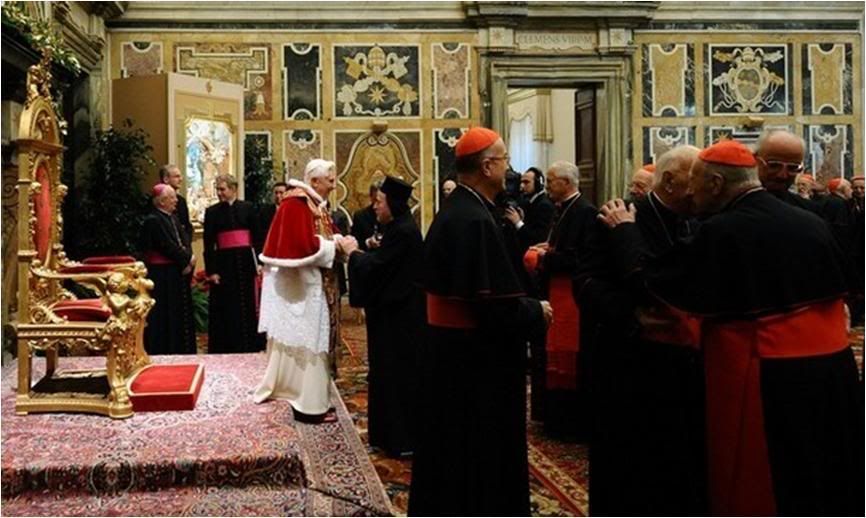 There have actually been reactions to the Pope's Curia speech of December 22 that saw beyond the controversial statements about the need for a human ecology (to save man from self-destructing).
THE SOUND OF MYSTERY
There have actually been reactions to the Pope's Curia speech of December 22 that saw beyond the controversial statements about the need for a human ecology (to save man from self-destructing).
THE SOUND OF MYSTERY
by Gianni Baget Bozzo
Translated from

Dec. 23, 2008
As usual, one of my favorite Italian commentators, the 84-year-old theologian and ex-politician Gianni Baget Bozzo chimes in with fresh insight, but what spoils this piece for me is that he starts with a near-explicit comparison between the public style and language of John Paul II and Benedict XVI, which is not only unnecessary - almost four years now into this Pontificate - but also gives the wrong impression that the difference between the two necessarily gives one an advantage in some way. The piece would be much better without the first two paragraphs.
Pope Benedict has a style different from his great predecessor who was in element in stadiums and spoke to young people in their language.
But if that was the only language possible, or at least, a necessary element for communication, then profound words would have no meaning, and the difference between words and sounds would not be seen in their reality.
For this Pope, the words used make a difference and can matter because of their content, not for their fire and flash.
And he believes his words can make a difference because he addresses himself first and foremost to Christians rather than to the general public. His aim is to build up the Church not to make news.
It is a style which seduces believers who want to remain such and truly rejoice in their Christian difference, who rejoice at words that are not 'images' but symbols that touch the heart and may not necessarily caress the ear. He addresses the individual who is everyman and not the mass which is no one.
Pope Benedict also wants his public events to be liturgies and thus place the image of the Church as a sacred institution even in the public square, to highlight the Christian distinction in the world, and in his capacity as Peter's Successor, to express the very essence of Catholicism.
In this way, Papa Ratzinger uses his own distinct personality, obliging the entire Church, bishops and faithful alike, to speak the language of mystery and liturgy, to pass from the language of the world to that of the singular entity that the Church is.
Benedict has carried out what is necessary to restore to the term 'Catholic' its sense of difference, of a significant difference:
this is his charism and his language.
In the same issue of La Stampa, another commentator picks up on Benedict's emphasis on the mystery of the faith.
The lack of communication
amid the din of everyday
by Franco Garelli
Translated from

Dec. 23, 2008
What might have led Benedict XVI to 'make an accounting' of World Youth Day during his Christmas message this year to the Roman Curia?
To deviate a bit from the mystery of Christmas in order to call attention to the fact that even in the Catholic world, there are those who see the spectacle but not the faith, the singer not the song, in the whole concept of WYD?
Perhaps for the Pope, Christmas today and an event like WYD are not that different - that they are two faces of the same coin. In both cases, the dominant culture of image rather than substance only looks at the superficial aspects of faith rather than its profundity.
Mystery is lost in the liturgy when its participants lose the capacity to see the reality of the Other, because they are so wrapped up in their daily environment so as not to see the horizon of the transcendent.
Benedict XVI said religious events should not be likened to a rock festival, and the Pope is not a star.
These are blunt words that are intended to recover for the public a sense of sacredness, shake up even church circles that have lost this sense, and indirectly distinguish the style of this Pontificate from his predecessor's.
He is asking the faithful to leave the din of everyday and rediscover the sense of mystery that should touch their life in its depth.
But we must ask whether and how it is possible today - for the Church and for the Pope - to widen and deepen the dimensions of faith among Catholics. It was the same problem faced by Jesus in his earthly life in trying to counter human expectations that were blind to his proposition of salvation.
Is it possible to inspire the faithful to new paths of spiritual commitment using the language of today - often spurious and ambivalent - and necessarily anchored only to actual material needs?
An editorial writer in Avvenire has a different thrust.
The Pope is not a moralist
despite what critics say
by MARINA CORRADI
Translated from

December 25, 2008
There was a line last week in Benedict XVI's catecheses on Advent that was singularly noteworthy.
The Pope started by recalling that the core message of Christmas is in John's Gospel - "Verbum caro factum est", The Word was made flesh. He points out that 'verbum' also means sense or meaning - the meaning of life, incarnated in a baby born in Bethlehem as 'a Word addressed to us", in Benedict's words.
Not a law, he said, but 'a Person who is interested in each and every human being", that is, in the life of every single being.
What was striking was not so much this fresh affirmation of Christian faith as the Pope's comment right after: "To many," he said, "this might seem to beautiful to be true".
'Too beautiful to be true': namely, the extraordinary promise of Christmas, too often forgotten by too many, a promise now interred in mere habit, from the splendid realization of the prophecy - "and a Son was given to us" - of the advent on earth of a God born as man who defeated the forces of darkness.
'Too beautiful to be true'. In this phrase, one perceives that this Pope is very much aware of the spiritual poverty of the daily life of Christians, their difficulty in truly believing in the salvation promised to them, while the rest of the world scoffs endlessly at Christian hope as being absurd and irrational, a myth that originated twenty remote centuries before our time.
And yet, a God who is not law but a person, was born of a woman, and born in order to love us and to save us. How many among us, believers corroded by a modernity that derides our faith, do believe in our hearts that the Christian promise is indeed 'too beautiful to be true'?
But Benedict XVI, with the authoritativeness of the Successor of Peter, immediately refutes this radical doubt: "Yes, there is a a meaning to life, and this meaning is not just an impotent protest against the absurd."
He responds with the sovereign calmness of a man who possesses a sure and tempered faith. But beyond this hope - so solid as to be almost tangible - there is the Pope's presence itself, who places himself alongside the faithful who may be distracted or vacillating or isolated. He understands their silent difficulties, and he walks among us along our daily journeys to remind us of he whom he represents on earth.
As the universal Pastor, he understands that we need to hear again and again, if need be, that what was true 2000 years ago continues to be true now and for always.
"God always speaks to the present," Benedict XVI told the Roman Curia, but at the same time, how much man today needs a face to go with the words!
In the media, this Pope has often been portrayed as authoritarian, inclined mostly to say NO, dogmatic, and offensive to the freedom of believers.
The other day an editorial in La Repubblica on the 'statolatry' denounced by the Church in Spain suggested that in fact, the Church is harboring the same idea but in the sense of a 'Christian state', which means a 'confessional' or faith-based state, and therefore, an unfree state.
The accusation by secularists against the the Church and those who lead it has always been this: that it wants to coerce consciences, that it negates human freedom.
But if one ignores what the newspapers say in their headlines and in their reporting - and reads directly what the Pope really says, which is always advisable to avoid misrepresentation - one cannot fail to note his profound identification with the faithful, and his desire to arouse and confirm their faith with full respect for their authentic freedom.
And he does this not with the moralism of someone who would reduce God to a law, but with the lovingness reflecting a God who is both Meaning and Person.
"God freely became man in order to make us truly free," the Pope observed during one of his Advent catecheses. To whoever has 'the ears of the heart' to listen to a promise that is, yes, 'too beautiful', but also true.
[Modificato da TERESA BENEDETTA 26/12/2008 17:09] |
 26/12/2008 13:33 26/12/2008 13:33 |
|
| | | OFFLINE | | Post: 16.081 | Registrato il: 28/08/2005
| Utente Gold | |
|
 ANGELUS TODAY
ANGELUS TODAY
The Holy Father delivered an Angelus homily today on the occasion of the Feast of St. Stephen.
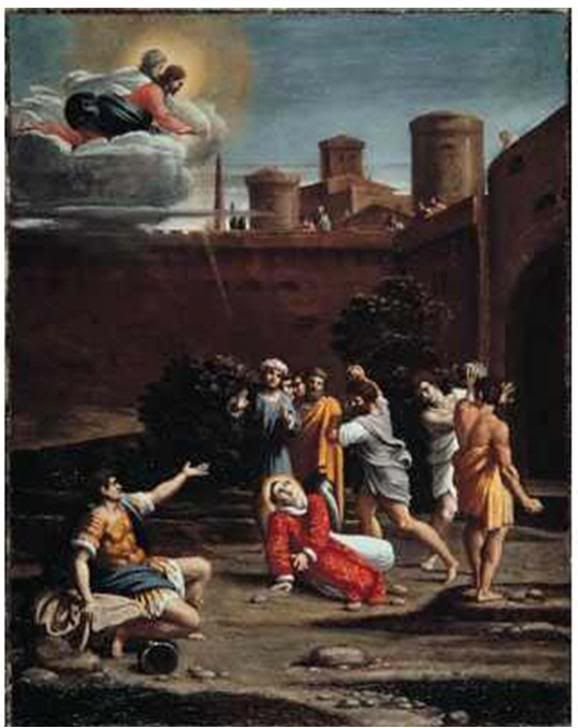 'Martyrdom of St. Stephen', A. Caracci, 1610, Oil on canvas, 64x150 cm. National Gallery, London.
'Martyrdom of St. Stephen', A. Caracci, 1610, Oil on canvas, 64x150 cm. National Gallery, London.
Saul, later the Apostle Paul, is shown at left.
In this Christmas season, we rejoice that "the grace of God has appeared!" (Tit 2:11); his mercy and love have been revealed in the face of the Christ-child born in Bethlehem!
Today’s feast of Saint Stephen reminds us that we are also called to follow Jesus to the Cross: though suffering is a part of life, a God who personally enters history has the power to save us through it.
With our eyes fixed on heaven, let us therefore "endure to the end", so that we might gaze upon his face for all eternity (cf. Mt 10:22). God bless you all!

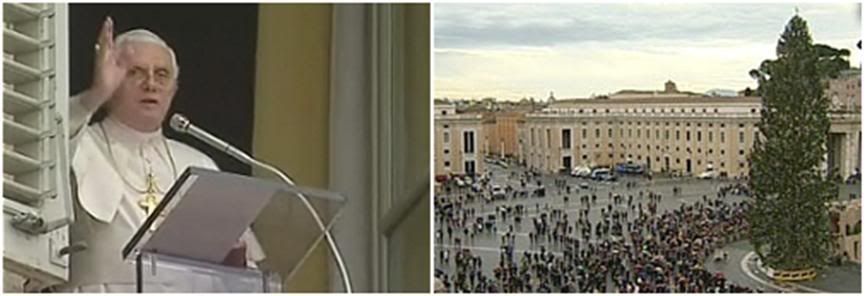 Here is a translation of the Holy Father's words today:
Here is a translation of the Holy Father's words today:
Dear brothers and sisters!
The feast today of St. Stephen, the first martyr of the Church, takes place in the spiritual light of Christ's Nativity.
Stephen, a young man 'full of grace and the Holy Spirit', as he is described in the Acts of the Apostles (6,5), was ordained a deacon in the first Community at Jerusalem, and because of his ardent and courageous preaching, he was arrested and stoned to death.
There is a detail, in the account of his martyrdom, which deserves to be highlighted in this Pauline Year, and that is the remark that "the witnesses laid down their cloaks at the feet of a young man named Saul" (Acts 7,58).
St. Paul appears [in the NewTtestament] for the first time, under his Jewish name Saul, as a zealous persecutor of the Church (cfr Phil 3,6), which at the time he considered a duty and cause for pride.
In hindsight, one might say that the testimony of Stephen was decisive for his conversion. Let us see how.
Shortly after Stephen's martyrdom, Saul, still impelled by his zeal against Christians, went to Damascus to arrest those whom he would find there. It was while approaching the city that 'lightning struck' - that singular experience in which the Risen Jesus appeared to him, spoke to him and changed his life (Acts 9,1-9).
When Saul, who had fallen to the ground, heard his name called by a mysterious voice, he asked, "Who are you, Lord?", and he heard the response, "I am Jesus whom you persecuted" (Acts 9,5).
Saul had persecuted the Church and had collaborated at the stoning of Stephen. He saw him die under the hail of stones, and above all, he saw how Stephen died: like Christ in everything, that is, praying, and forgiving his killers (cfr Acts 7,59-60).
On the road to Damascus, Saul came to understand that in persecuting the Church, he had been persecuting Jesus who had died and was truly resurrected - Jesus living in his Church, living in Stephen too, who had seen him die, but who now certainly was with his resurrected Lord.
We can almost say that in the voice of Christ, Saul heard that of Stephen, and that by the intercession of the latter, divine grace had touched his heart.
And that is how Paul's life changed radically. From that time on, Jesus became his 'righteousness, sanctification, and redemption' (cfr 1 Cor 1,30), his everything. And one day, he too would follow in Stephen's footsteps, to shed his own blood, in witness to the Gospel, here in Rome.
Dear brothers and sisters, in St. Stephen, we see the realization of the first fruits of salvation that the Nativity of Christ brought to mankind: the victory of life over death, of love over hate, of the light of truth over the shadows of deceit.
Let us praise God and may this victory allow Christians even today not to answer evil with evil, but with the power of truth and love.
May the Virgin Mary, Queen of Martyrs, obtain that all believers may courageously follow the same path.
After the Angelus prayers, he had these special messages on the international situation:
In the Christmas atmosphere, one feels concern more strongly for those who are in situations of suffering and grave difficulties.
My thoughts go, among others, to the two Italian consecrated sisters, Maria Teresa Oliviero and Caterina Giraudo, of the contemplative missionary order of Fr. de Foucauld, who were kidnapped more than a month a and a half ago, along with some of their local co-workers, from the village of El Waq in northern Kenya.
I would like them to feel the solidarity of the Pope and the whole Church behind them. May the Lord, who in being born as man came to make us a gift of his love, touch the hearts of their abductors, and grant that our sisters may be released soon so they may continue with their disinterested service to their poorer brothers.
For this, dear brothers and sisters, I invite everyone to pray, without forgetting the numerous other persons held captive in other parts of the world, about whom we are not always able to get clear information. I think of the captives for political or other reasons in Latin America, in the Middle East and in Africa.
May our fraternal prayers be of intimate spiritual assistance to all of them.
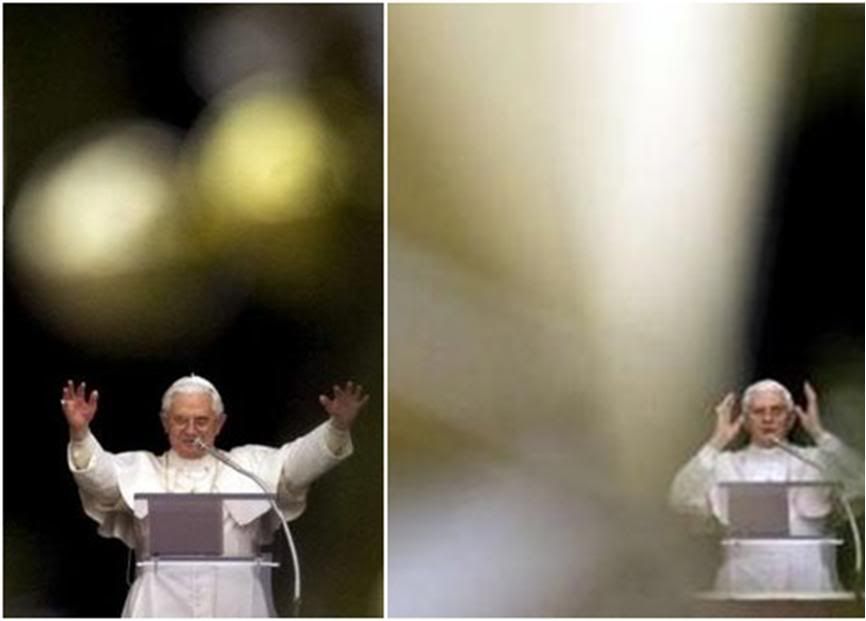
* * * * * * * * * * * * * * * * * * * * * * * * * * * * * * * * * * * * * * * * * * * * * * * * * * * * * * * * *
No OR today.
The next issue will be that for Dec. 27-28,
to be posted online on Saturday afternoon.
[Modificato da TERESA BENEDETTA 27/12/2008 05:45] |
 26/12/2008 20:40 26/12/2008 20:40 |
|
| | | OFFLINE | Post: 1.696 | Registrato il: 27/11/2005
| Utente Veteran | |
|
That address to the curia
Go to the link above to see how the BBC reported the address which was supposed to be "homophobic". I don't know who the Rev. Sharon Ferguson is, but she obviously doesn't know the Bible! Why on earth quote a lady vicar [priestess!]? So, you see what it's like in England. Very little, if any, support for the Pope from the bishops of England and Wales! |
 26/12/2008 22:56 26/12/2008 22:56 |
|
| | | OFFLINE | | Post: 16.086 | Registrato il: 28/08/2005
| Utente Gold | |
|
 The Pope and the accusation
The Pope and the accusation
of homophobia: Why his Christmas message
to the Roman Curia caused an outcry
by PAUL BADDE
Translated from

Dec. 23, 2008
Here is a translation of the item syndicated by Kathnews that Heike/Cowgirl called attention to on Christmas Eve.
VATICAN CITY - "Perish the day on which I was born," cries Job despairingly in the Bible, "the night when they said, 'The child is a boy!'"
This dismaying drama is about 2500 years old, but the cry (Job 3,3) also contains another acknowledgment about a fact whose age goes back to the beginnings of the human story, namely, the original sex identification of a human being as he is at the moment of birth.
That is the difference by which every midwife, even in the darkest night when she cannot see, would recognize by touch whether the new baby is a boy or a girl.
This basic difference is an anthropological constant in all world religions - and belongs to the Christian image of man. But the time is past when this image of the human being can be considered obvious or binding.
At the time of the United Nations world conference on women held in Beijing in 1995, an artificial human image was consecrated that has since become the centerpiece of a global civilian religion.
It's no longer a penis and a vagina, or a beard and breasts, that determine the sex of a human being, but his own feelings and free choice.
The core value of this world view is equality - which is the wonder tool with which any improper treatment of a woman (and every man who feels he is a woman) can be met head-on, de facto and de iure.
While male and female are traditionally not identical - or worse yet, considered 'not equal' - then from now on, an objective difference can no longer be the criterion for determining one's sex, but only one's own subjective and free choice.
Thus, to the fundamental rights of man, it is proposed to add also his freedom to choose his gender and sexual orientation, to decide whether he/she/it will be man or woman, or homo-, bi- or trans-sexual.
From hereon, the concept of 'gender' would differentiate a person's social sex from his/her biological sex. And such differences must, of course, be treated with utmost sensitivity.
Such a reconstruction of the human image according to these premises naturally has no less powerful implications as the erstwhile Communist attempt to create a new man, as shown by the consequences of so-called 'gender mainstreaming' (since 1999, an official 'leading principle and cross-sectional task' of German policy).
The equiparation of so called 'gay marriage' with a normal marriage between man and woman also belongs unconditionally to this new concept of human 'nature', along with full and unconditional freedom of abortion at any time during a pregnancy - in which abortion is considered a human right.
And therefore, naturally, an embryo cannot be considered a person. And so on....
Here is how one Italian Vaticanista reported the 'controversial' part of the Pope's Curia address - in full good faith, and without the explicit extrapolations tuncalled-for that much of MSM media gave it:
Papa Ratzinger's ecologism
and a hymn to 'Humanae vitae'
(and against gender ideology)
by Paolo Rodari
Translated from

Dec. 23, 2008
Well-informed sources say that Benedict XVI's trip to Brazil in May 2007 had a profound effect on the Pope. That it was where the Pope understood with abundant proof that today, he Church must fight to defend man as a creature of God, in the same way that Paul VI defended human life in the unforgettable encyclical Humanae vitae.
That the profound problems of Brazil, and South America in general, do not reside primarily in the deplorable attack on the environment, specifically in the vast Amazon rainforest, but that there, as in other parts of the world, the problem is the increasing loss of faith which lays the foundation for man's responsibility towards the environment.
It was not by chance that yesterday morning, Benedict XVI mentioned the tropical rainforests, in stating one of the principle points of his Christmas address to the Roman Curia - his call for respect of the natural order of creation which, if unheeded, would lead to man's self-destruction.
He said that "the tropical rain forests deserve our protection, yes, but man does not deserve it less as a Creature of the Spirit himself, in whom is inscribed a message that does not mean a contradiction of human freedom but its condition".
Thus, the Pope synthesized what he means by the term 'an ecology of man': to respect man means to respect nature, the human being created as man and woman. Not to respect this natural order (and there are various ways of doing so) leads to man's self-destruction.
And that to live by emancipating oneself from the natural order is wrong. "That which has come to be expressed and understood with the term 'gender' effectively results in man's self-emancipation from Creation (nature) and from the Creator".
In this way, he said, "man wants to do everything by himself" but this means "to live against truth, to live against the Spirit Creator".
There was much of Pius XII in this papal address by Benedict XVI - the Pontiff who, more than any other, has spoken frequently of a 'healthy ecologism' that man must learn to practise.
There is, obviously, Humanae vitae, with which Paul VI had defended "love against consumer sex, the future against the exclusive claim of the moment, and human nature against manipulation."
And then, there were the Pope's notes from his Brazil visit: not just the huge crowds, and enthusiasm to high heavens, but the increasingly widespread incapacity of man to recognize himself as 'designed by God'.
 A comment about speaking up for the Pope over this latest outcry: so far, I have not read any bishop speak up - so the bishops of Wales and England are not an exception on this.
A comment about speaking up for the Pope over this latest outcry: so far, I have not read any bishop speak up - so the bishops of Wales and England are not an exception on this.
The closest I have read is from Father Lombardi's weekly editorial on Vatican Radio, in which he praises the beautiful things that the Pope actually said in the address to the Roman Curia - man's wonder and joy in a world designed to be deciphered by man himself in its physical structure. Fr. Lombardi only indirectly refers to the misplaced outcry of homosexuals and others who do not classify themselves as male or female, by saying:
"The wonder continues in recognizing the beauty of the creation of the human being as man and woman. Adam's cry of surprise and joy when God presented him with a woman echoes from the very first page of Scripture. The anthropological confusion that obscures the significance of that encounter risks extinguishing the very source of that joy."
Probably the relative discretion from the Church hierarchy is a tacit acknowledgment of the fact that so far, there have been no attacks on the Pope to be taken seriously, apart from the malicious newspaper headlines, tendentious reporting, and pushbutton commentaries by the gender ideologues - all of which have been totally predictable and par for the course.
Of course, this is not to say that their predictability reduces their annoyance factor (or worse) in any way, but after all, the Lord himself warned that following him would always be 'a sign of contradiction' to and in the world.
[Modificato da TERESA BENEDETTA 30/12/2008 03:56] |
 27/12/2008 00:33 27/12/2008 00:33 |
|
| | | OFFLINE | | Post: 16.087 | Registrato il: 28/08/2005
| Utente Gold | |
|
 Top 10 neglected Catholic stories of 2008
Top 10 neglected Catholic stories of 2008
All Things Catholic
by John L. Allen, Jr.

Friday, December 26, 2008
For most media outlets in the United States, there were really only two big Catholic stories in 2008: Pope Benedict XVI’s April 15-20 visit to Washington and New York, and the fate of the “Catholic vote” in the November elections.
Both, of course, were important tales to tell, and for the most part Church officials have no right to complain. Saturation coverage of the Pope’s trip alone probably meant the Catholic Church drew more positive notice in ’08 than in most years, especially recently.
Yet inevitably, plenty of other important Catholic stories flew below the radar. To remedy that, here’s a rundown of the “Top Ten Neglected Catholic Stories of the Year.”
10. Benedict’s “Second Act” in France

While the pope’s trip to America drew bell-to-bell coverage, his Sept. 12-15 visit to France might as well have been on the dark side of the moon in terms of American media interest.
That’s too bad, because it offered “volume II” of Benedict’s reflections on Church/State relations. In the States, Benedict praised a model of Church/State separation that, in his view, means freedom for religion rather than freedom from religion.
In France, he closed the loop by challenging their model of laïcité (secularity), which the Pope sees as exiling religion from public life. That’s likely to be a battleground for some time to come, since laïcité is more or less presupposed by the architects of the new Europe.
9. O’Brien and the Legionaries of Christ
In June, Archbishop Edwin O’Brien of Baltimore demanded greater transparency from the Legionaries of Christ and their lay arm, Regnum Christi, and barred them from one-on-one spiritual direction with anyone under 18.
The fact that O’Brien, who is no one’s idea of a doctrinal liberal, took those steps suggested that controversy surrounding the Legionaries is not merely about the usual left/right tensions.
The story raised larger questions about how to balance the zeal and missionary spirit of some of the “new movements” against the need for proper oversight and accountability.
8. The Bishops and Immigration
Amid suggestions that the American bishops had a single-issue focus on abortion, their outspoken approach to immigration sometimes got lost.
In September, the bishops called upon the Department of Homeland Security to halt immigration raids, asserting that the “humanitarian cost” was “unacceptable in a civilized society.”
Over the summer, Cardinal Roger Mahony of Los Angeles asserted that “a human being’s worth is defined by their God-given dignity, not by what papers they carry.”
That position brought blowback; an invitation to generosity by Benedict XVI during his visit, for example, caused CNN’s Lou Dobbs to fume, and some conservatives threatened to challenge the church’s tax exemptions if it pushes a pro-immigrant line.
While the election of Barack Obama augurs battles over the “life issues,” immigration reform may be an area where the bishops and the new administration can do business.
7. Ups and Downs in Dialogue

In November, a new “Catholic/Muslim Forum,” meeting in Rome, symbolized commitment to dialogue in the wake of Benedict’s controversial citation two years ago of a Byzantine emperor to the effect that Muhammad brought things “only evil and inhuman.”
The forum concluded with a statement recognizing a right to religious freedom. It will meet again in 2010, in a Muslim nation.
Meanwhile, Catholic/Jewish ties saw new flashpoints. The year began with fallout from revival of the old Latin liturgy, including a Good Friday prayer for conversion of Jews. The prayer was amended by the Vatican, though not to everyone’s satisfaction.
In June, the U.S. bishops deleted a line from their catechism that said the Mosaic covenant “remains eternally valid.” (The bishops said the line wasn’t wrong, just misunderstood.)
In September, Benedict praised Pope Pius XII, whom some Jews fault for alleged “silence” on the Holocaust. Despite these tensions, most experts say Catholic/Jewish relations remain sound, and Benedict’s visit to the Park East Synagogue in New York reaffirmed his desire for “bridges of friendship.”
6. Benedict’s Unique Shade of Green

Throughout ’08, the Pope continued to craft his distinct form of Christian environmentalism, in a way seemingly destined to give everybody heartburn. To conservatives, Benedict insisted that the doctrine of creation requires engagement from the church on issues such as the rainforests or climate change, whatever fears they may have about baptizing Greenpeace; for liberals, Benedict asserted that ecology cannot be separated from the church’s defense of other aspects of creation, such as unborn life and marriage.
One sign that this budding environmentalism has made some people nervous is that Benedict felt compelled to lay it out one more time in his year-end address to the Roman Curia, where Popes often try to reassure their lieutenants about aspects of their activity which have raised eyebrows in the Vatican.
5. Changing of the Guard at the CTSA
Fairly or unfairly, the Catholic Theological Society of America has long been seen as the leading forum for the church’s “loyal opposition.”
The group’s June meeting in Miami, however, was devoted to the theme of “generations,” and it gave voice to a rising cohort of younger theologians -- at least some of whom appear less interested in challenging the Church than secular culture, and for whom the traditional polarization between left and right doesn’t hold much appeal.
What that might mean for the future of Catholic theology in America will be a fascinating trend to track.
4. The Synod on the Bible

Synods of Bishops in Rome are easy to write off as expensive talk-shops, but for those with ears to hear, they offer a unique sounding board for currents in the global church.
The Oct. 5-26 synod dedicated to the Bible offered a case in point; among other things, contributions from bishops from Africa, Asia, the Middle East, and other parts of the world suggested that the struggle against secularism is to some extent a Western preoccupation.
In the end, a basically moderate line seemed to prevail; in their final propositions, the bishops called for admitting women to the ministry of lector, and gave a strong thumbs-up for lay-led liturgies of the Word and for small ecclesial communities.
3. Identity Pressures on Catholic Charities
Efforts to assert a strong sense of traditional Catholic identity represent a leading “mega-trend” in the church these days, and in 2008 those efforts reached down into Catholic charities.
In January, Cardinal Paul Josef Cordes, the Vatican’s top official for charitable activity, endorsed Denver Archbishop Charles Chaput’s threat to shut down church-run charities if the state barred them from hiring on the basis of religious affiliation.
Later in the year, Catholic Relief Services faced criticism that some of its HIV/AIDS prevention materials promoted condoms, and the Catholic Campaign for Human Development came under fire for its links to the controversial community organizing network ACORN.
Collectively, all this suggests that charitable agencies will face growing pressure to be sure that they consistently “think with the church.”
2. The Jesuits Come in from the Cold
The John Paul years were occasionally marked by tension between the Society of Jesus and the papacy -- which, to the outside world, offered a symbol of the alienation of moderate-to-progressive Catholics from the church’s leadership.
The election of a new Jesuit superior in January created a chance for Benedict XVI and the Jesuits to turn a new page, and by most accounts, it worked. Some Jesuits said they actually wept with joy after a Feb. 21 audience when Benedict told them, “The church needs you, counts on you, and continues to turn to you with confidence.”
Benedict has also put his money where his mouth is, naming Jesuits to key posts such as Vatican spokesperson and secretary of the Congregation for the Doctrine of the Faith.
While this rapprochement doesn’t mean everything is sweetness and light, it at least suggests that the order is back on good speaking terms with the Shepherd-in-Chief.
1. The Crisis in India

The anti-Christian violence that broke out in India over the summer was hardly just a Catholic story, but Catholics were dramatically affected: A lay Catholic missionary was burnt alive as she tried to rescue children from a church-run orphanage; a young nun was raped; parishes, convents, hospitals and schools were sacked.
Beyond the human toll, the crisis offered an important wake-up call. India is a rising power, but it also faces a rapidly metastasizing form of Hindu extremism.
If things break the wrong way, the Indian subcontinent could become the new Middle East -- a perpetually destabilized region whose animosities seed conflict around the world, radicalizing a global Hindu diaspora.
India is also a great 20th century Catholic success story. The Church exploded from less than two million faithful to 18 million, and by 2050 there could be almost 30 million Indian Catholics.
It’s an inspiring social as well as spiritual triumph; some 60 to 75 percent of Indian Catholics are either from rural tribes or the “untouchable” caste, and both groups experience the faith as a liberating force from oppression. All of that, however, could be at risk if India can’t resolve its cultural and religious tensions.
American Catholics may be in a special position to help, given that improving relations with India has been one of the few foreign policy success stories of the Bush administration.
[Modificato da TERESA BENEDETTA 27/12/2008 13:57] |
 27/12/2008 06:38 27/12/2008 06:38 |
|
| | | OFFLINE | Post: 916 | Registrato il: 19/11/2005
| Utente Senior | |
|
|
 27/12/2008 17:03 27/12/2008 17:03 |
|
| | | OFFLINE | Post: 3.502 | Registrato il: 23/11/2005
| Utente Master | |
|
Thwarted Benaddict
Here is the inevitable You Tube video of the person in red (it does look like a woman) running at Papa as he processes out of Midnight Mass on Christmas Eve. The action is on the extreme right side of the picture.
And yes, Nan, we can see enough of the action to determine that it wasn't you.
www.youtube.com/watch?v=k9lL0c2oL8w
[Modificato da benefan 27/12/2008 17:07] |
 28/12/2008 14:59 28/12/2008 14:59 |
|
| | | OFFLINE | | Post: 16.092 | Registrato il: 28/08/2005
| Utente Gold | |
|
[Modificato da TERESA BENEDETTA 28/12/2008 15:51] |
|
|
|
|